OddCameras.com
Musashino Rittreck / Optika IIA / S-P
The
Musashino
Kōki company made the Rittreck cameras from 1955 onwards. It closed its
doors
in 1969. Wista, a trading company at first, sold some of the remaining
Musashino stock. Since 1972 Wista launched its own production, it still
makes
field and technical cameras.
The Rittreck IIA is a 6×9cm SLR without a revolving back, launched in
1955 by Musashino Kōki. The Optika IIA was a brand name of the
Rittreck IIA, sold by Seymour's, a distributor based in New York. It is
one of the very few 6x9cm SLR cameras ever built.
The standard lens is the Luminant 105mm f/3.5. The "wide" lens was only
slightly wider, 92mm, RetroFocus lenses allowing wide angle lenses in SLR cameras were not yet available. There were longer
lenses up to 400mm and extension tubes.
Most cameras have a single shutter speed dial with either 1/400s or
1/500s as the top speed and 1/20 as lowest, but some models have a separate dial for
slower speeds. These are mostly Rittreck S-P models.
Besides backs for cut film and film packs, there are 3 types of rollfilm holders.
Type I holder has no removable insert and no automatic stop. It allows
3 formats (with masks for the smaller formats): 10 pictures 6x7cm, 12
pictures 6x6cm or 15
pictures 4.5x6cm per roll of 120 film. It
has 3 film counters on the top of the holder, one for each format. Film
advancing is made by turning a knob and watching the
corresponding counter window.
Type II holder has a removable insert and room for storing 2 spare film rolls. It gives 8 pictures 6x9cm per 120 roll. It has an
automatic stop. You have to push a lever to allow moving to the next frame.
The type III holders are single format holders for the smaller formats, 6x7cm, 6x6cm and 4.5x6cm. All 3 have an
automatic stop. Like the type II, there is a small
lever that to be pushed to advance to the next photo.
The Rittreck roll film holders have one major inconvenience: the
exposed 120 film is wound with the backing paper on the inside of the
spool and
the light sensitive film side on the outside. So there is no
information about the type of film visible from the outside of an
exposed roll of film. Keep this in mind.
The 6x9cm focusing screen is a bright, high quality screen with a
Fresnel lens and has frame-lines for 6x7cm, 6x6cm and 4.5x6cm formats.
The camera seems to be on the heavy side, with lens and holder it
weighs about 2.3 Kg. Seen the format, that's not so much. A Mamiya
Universal with lens, grip and back weighs as much, isn't that compact
and isn't a SLR. A 6x7 Mamiya RB67 weighs more.
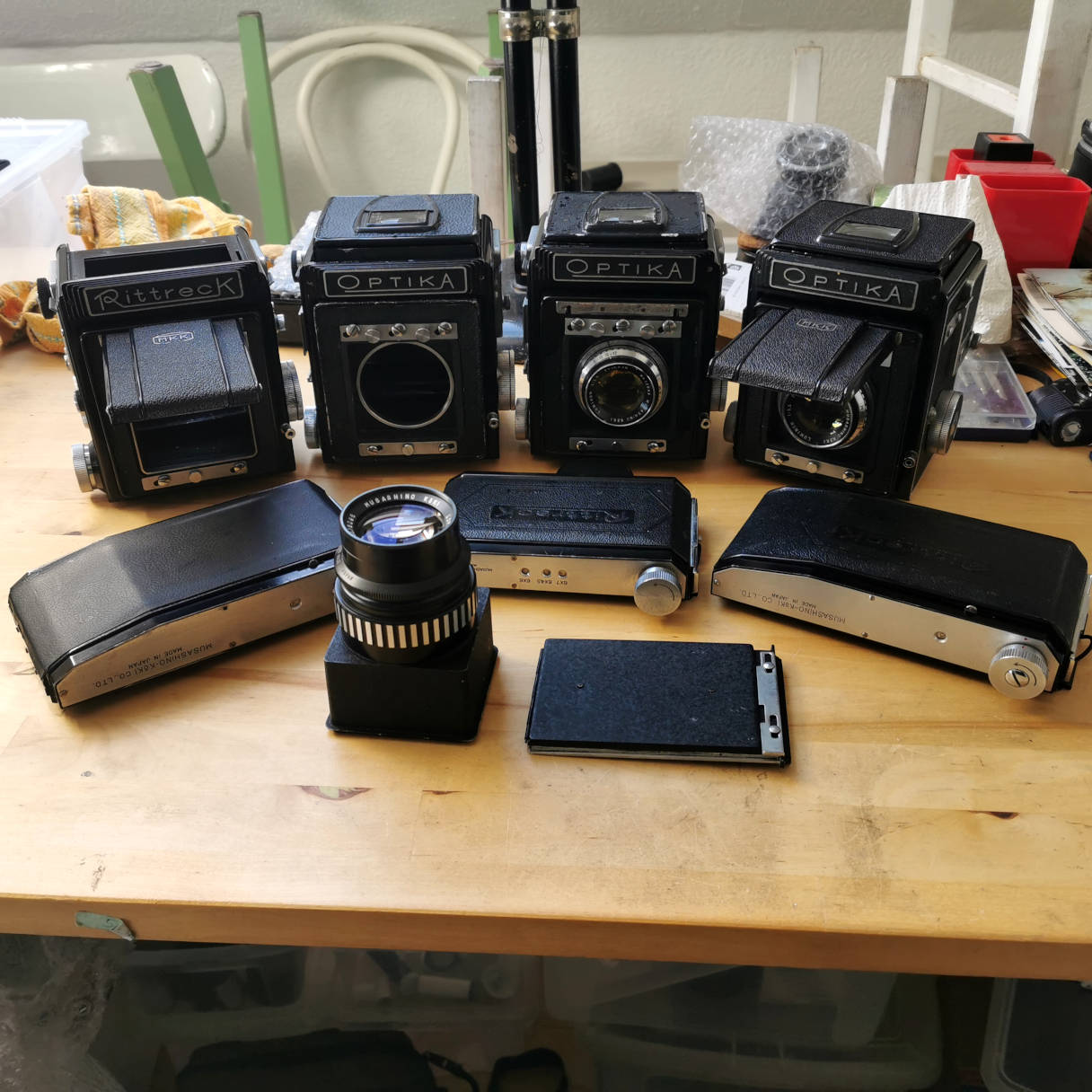
I own 4 different bodies, 3 Optica IIa and a Rittreck S-P with slow
speeds, but not working..
The first camera looks quite battered, but works very well. The
shutter shutter has been serviced recently. All were reasonably priced so that I could
not resist.
Some photos:
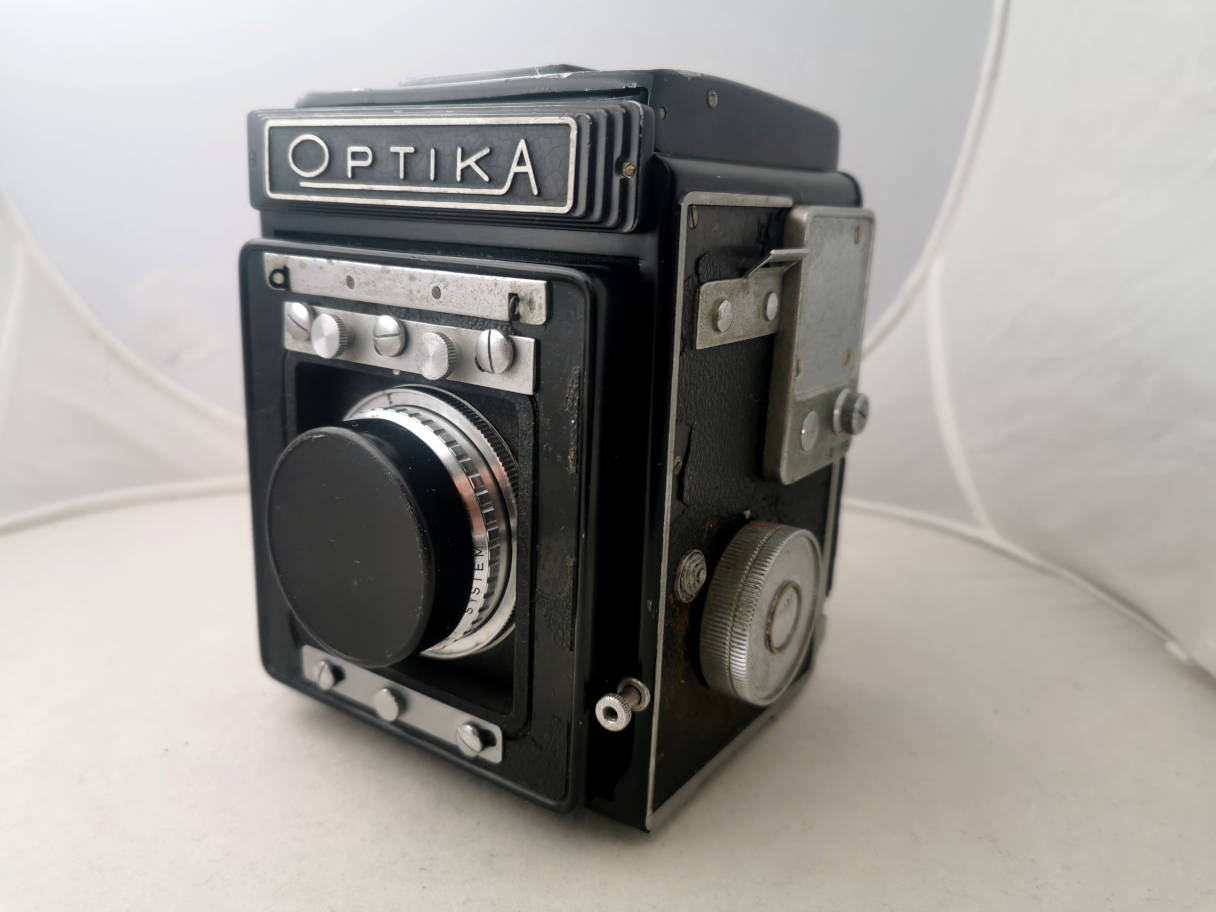
This camera lacks the flap that usually covers the font.
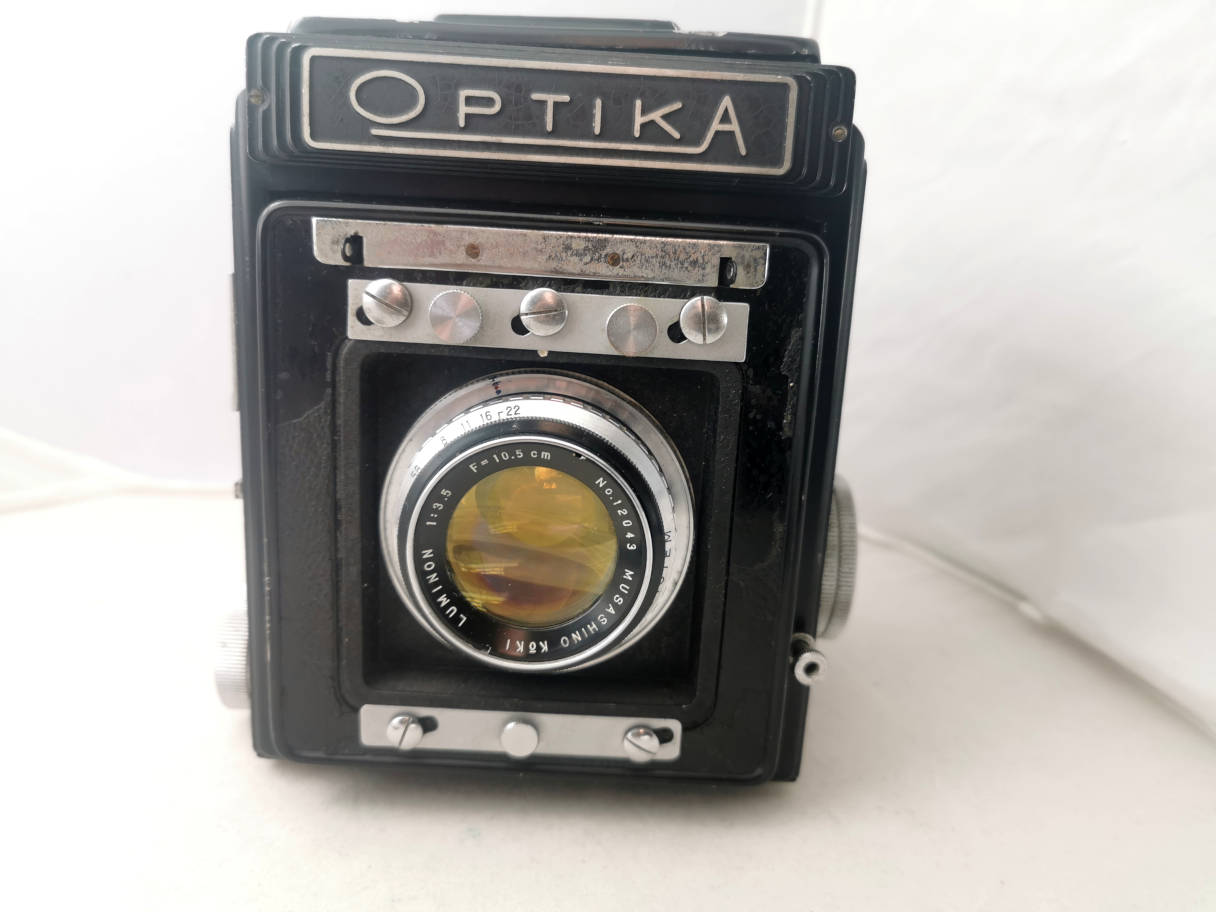
Camera
with standard 105mm lens. Why both of my lenses are "Luminon" and not
"Luminant" I do not know. There seems to be no difference. I have not
found any information about this. Aperture setting around the lens. A
ring on the front of the lens
can be turned to open aperture for focussing and has to be moved back
to the preset aperture before taking a picture. Shutter relase on the
right edge of the camera.
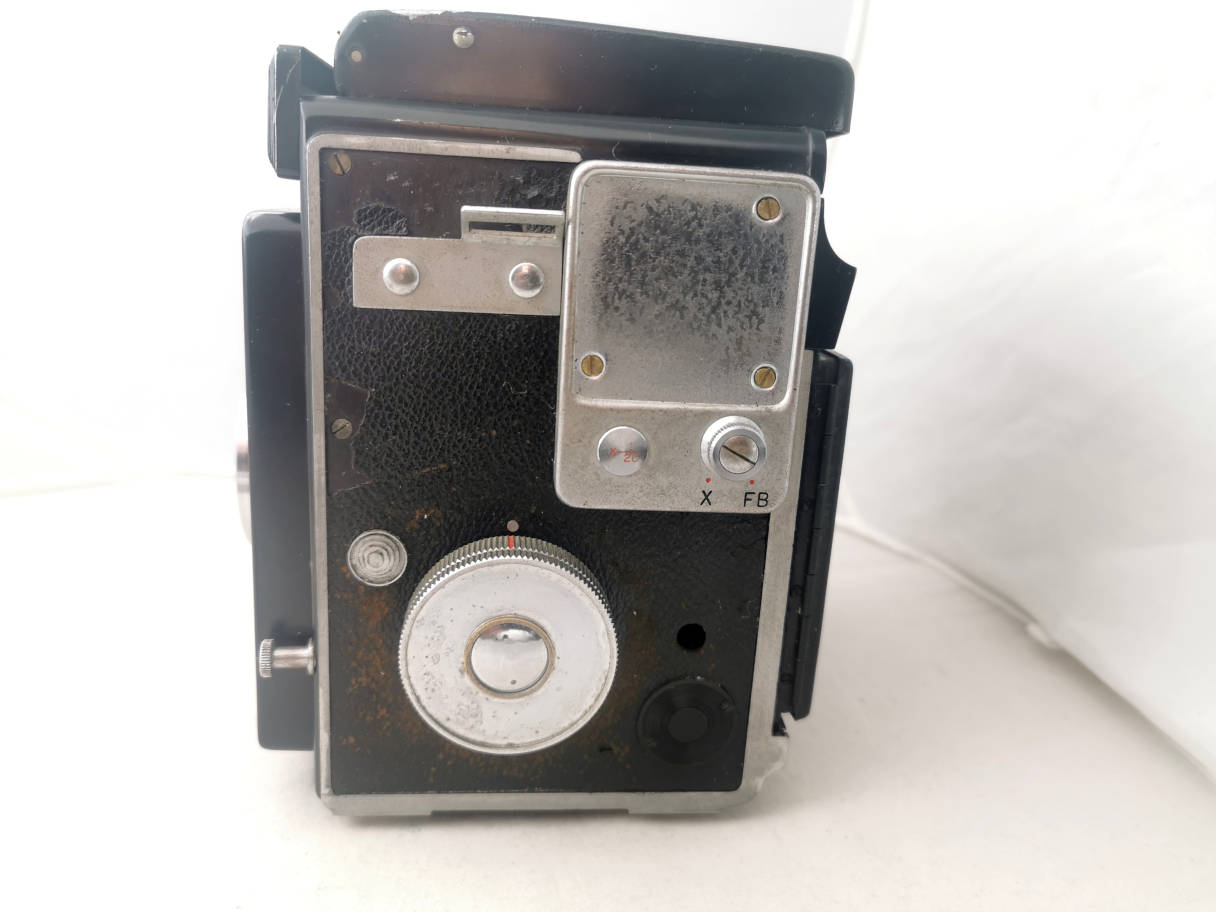
Right side. Flash sync switch and strap lug. Advance and shutter
cocking via the big knob, moves counter-clockwise. Little lever to
block shutter release.
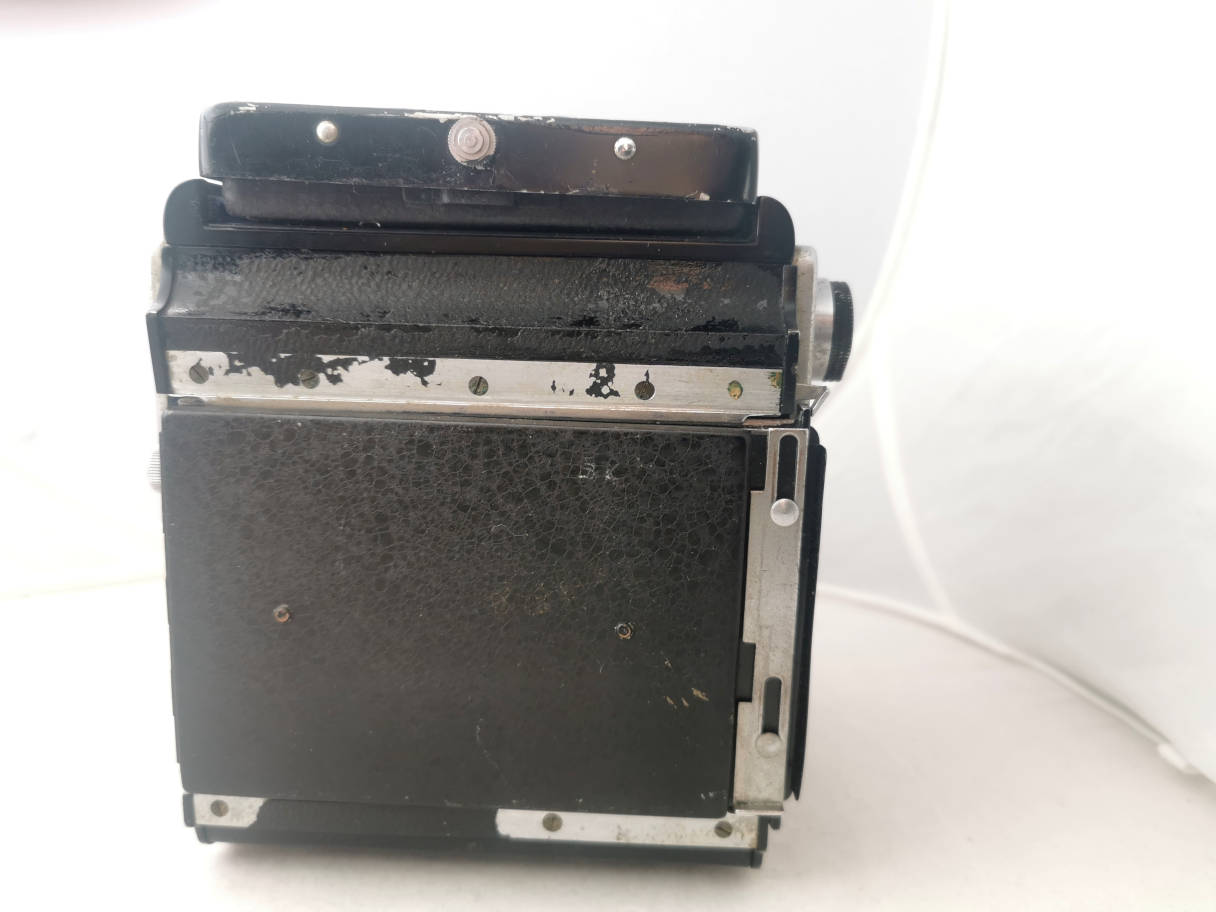
Back view. Sheet holder mounted.
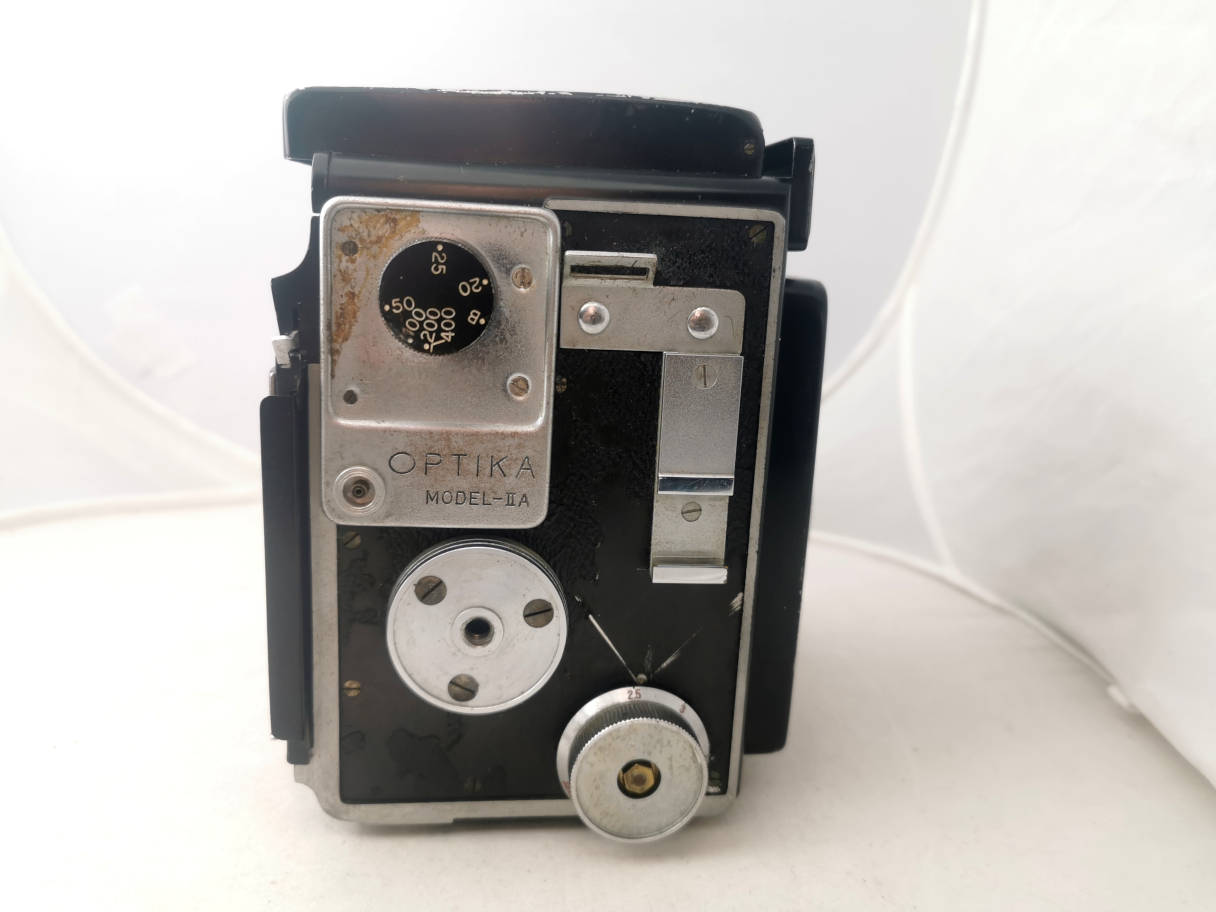
Left side. Speed setting. To change
speeds, you have to pull the knob away from the body and then turn to
the desired speed. Always cock the shutter before speed setting!
Another strap lug. Flash socket. Accessory holder. Tripod socket for
portrait format. Distance setting.
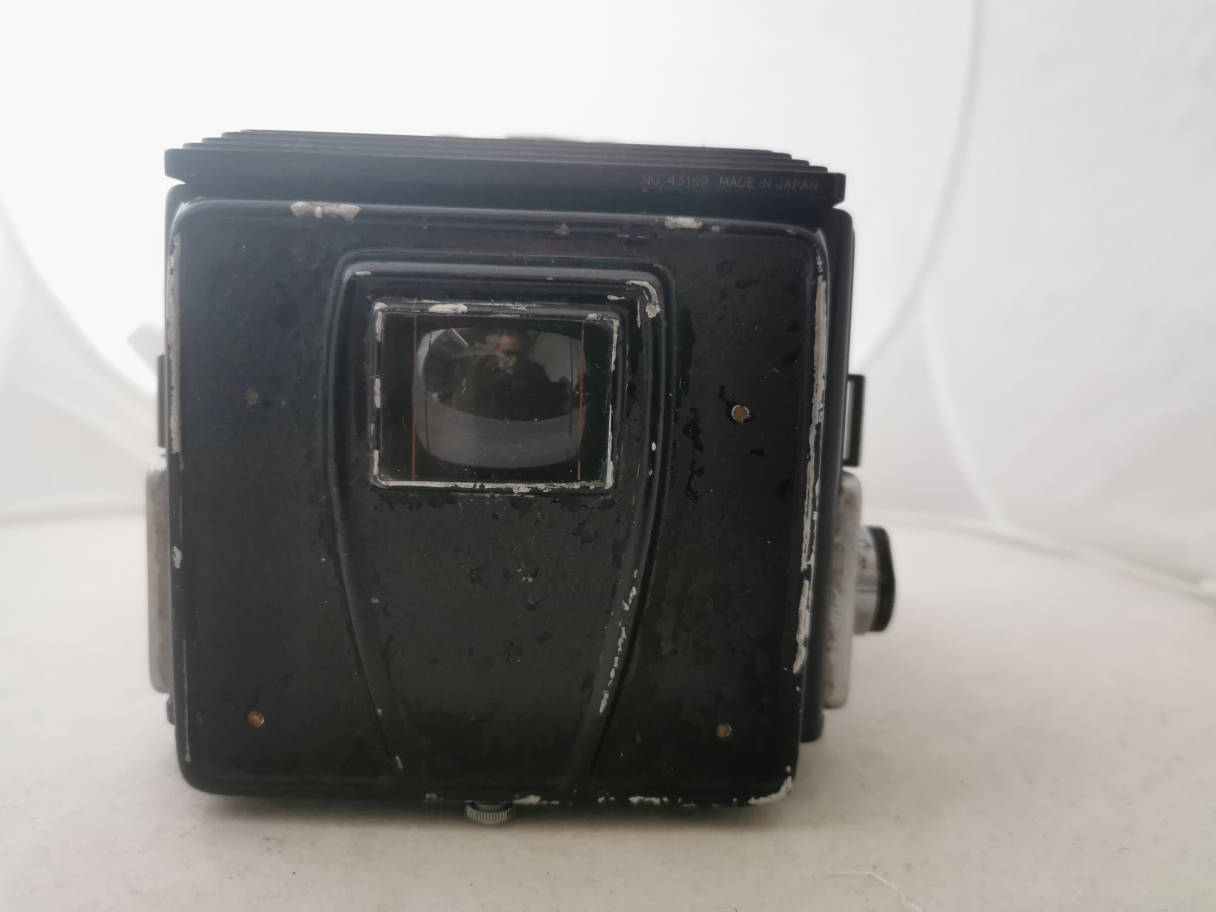
Seen from above.
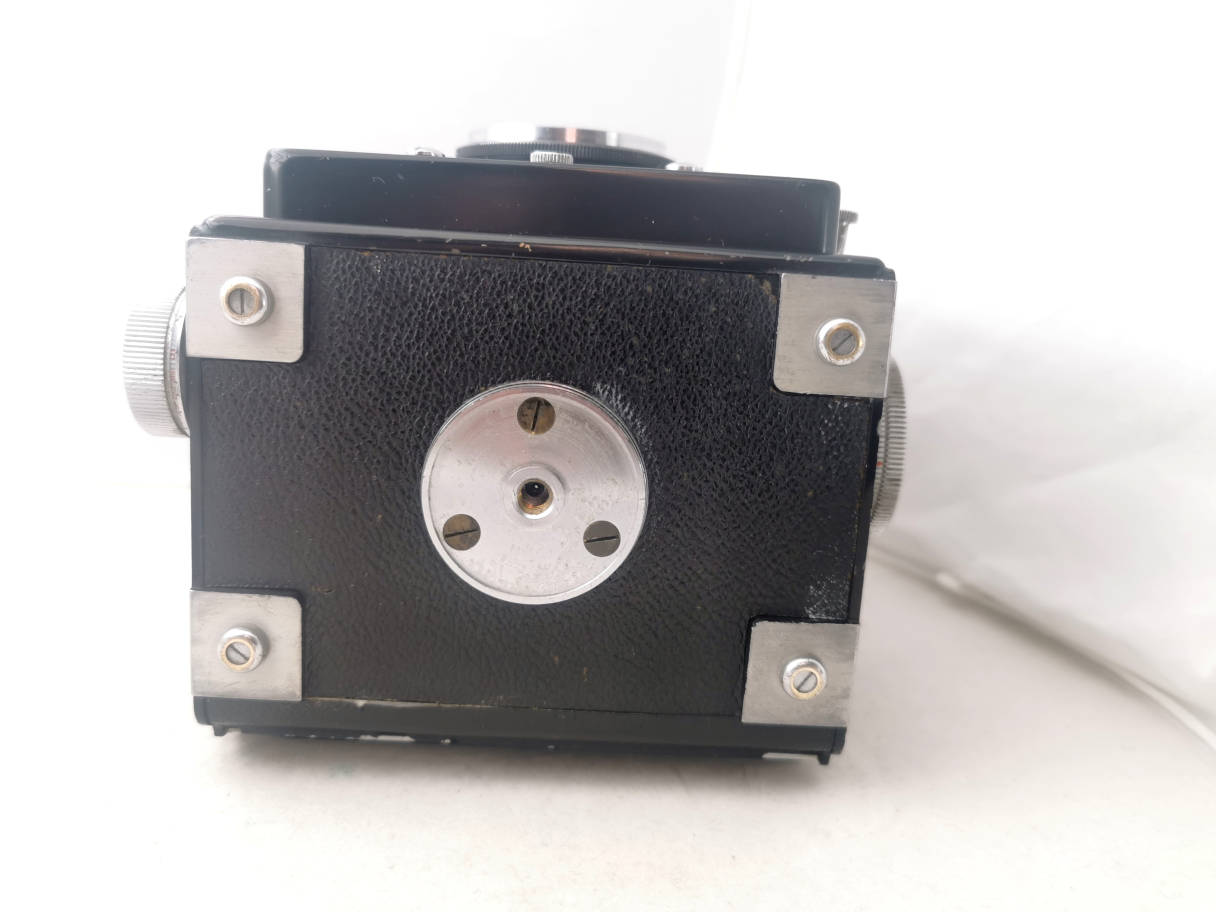
Camera bottom. Tripod socket.
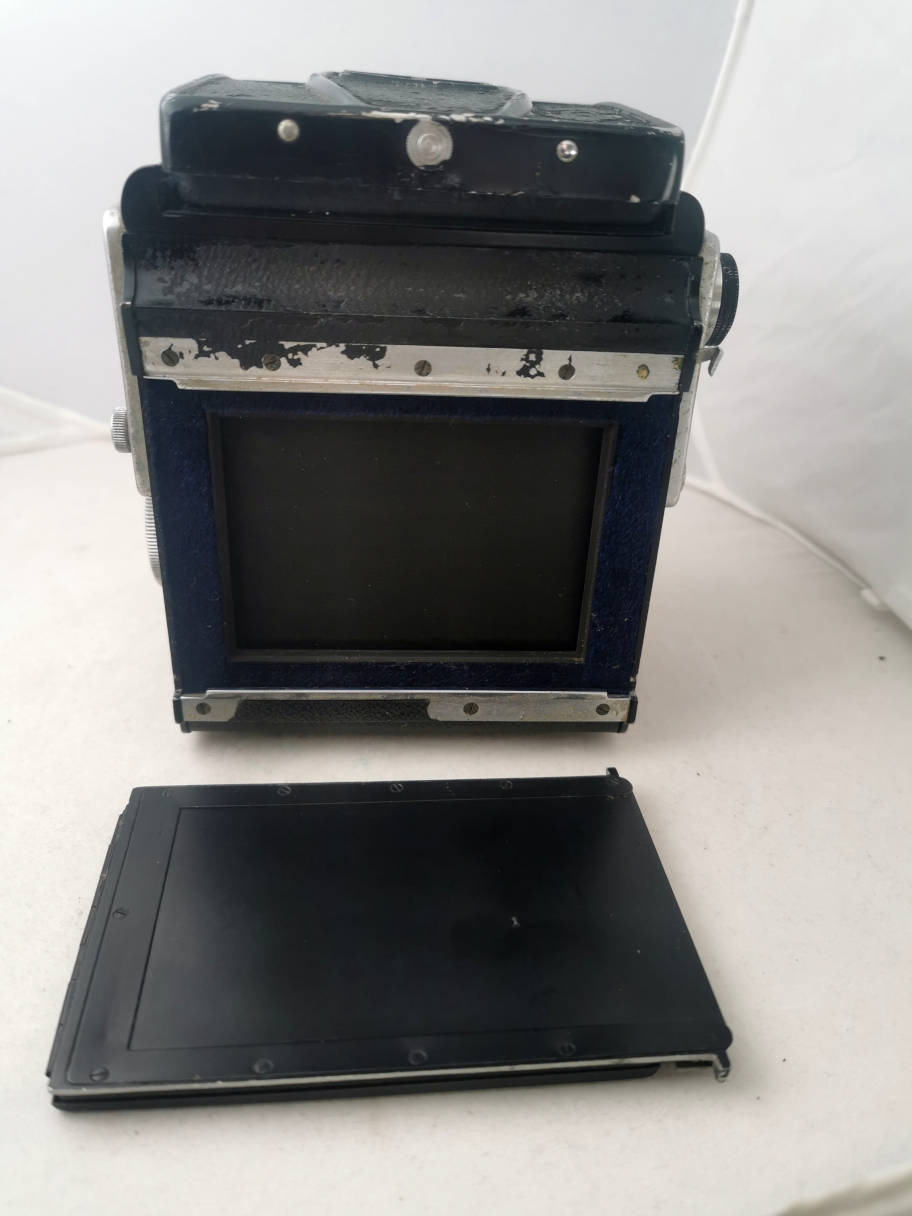
Film holder taken off. Do not touch the shutter cloth. The mount is
standard, holders from old 6x9 folding cameras fit as well as old roll
film holders.
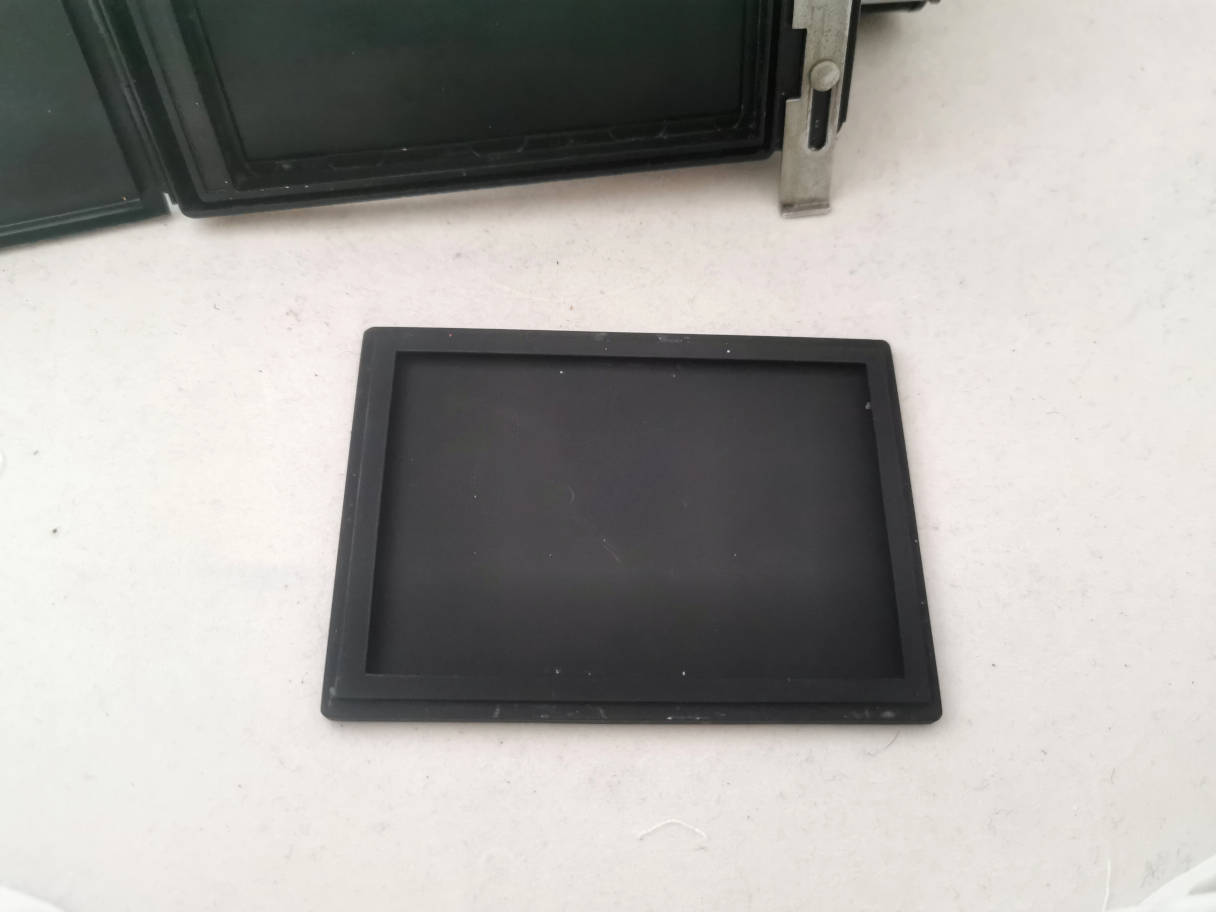
Insert taken out. Sheet film frame side...
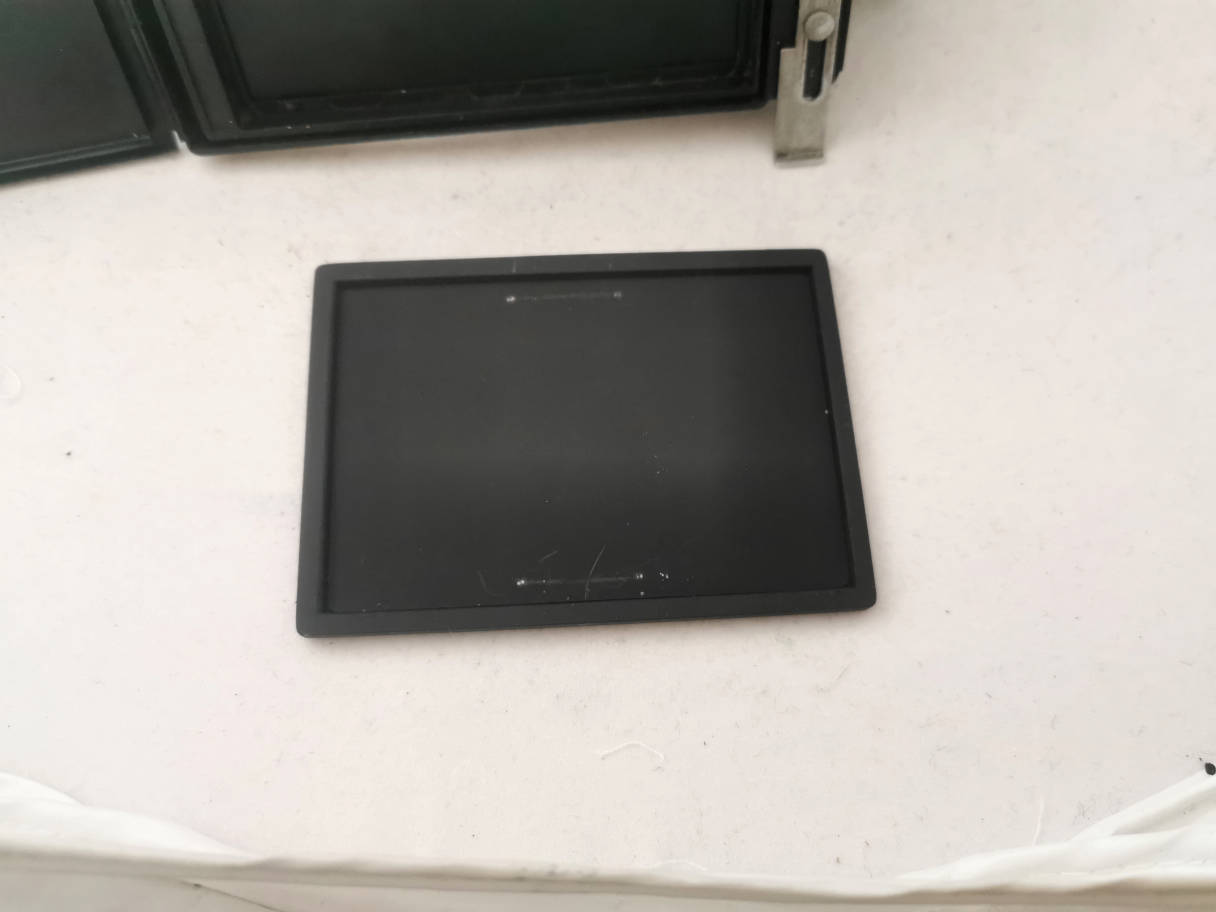
...and glass negative side.
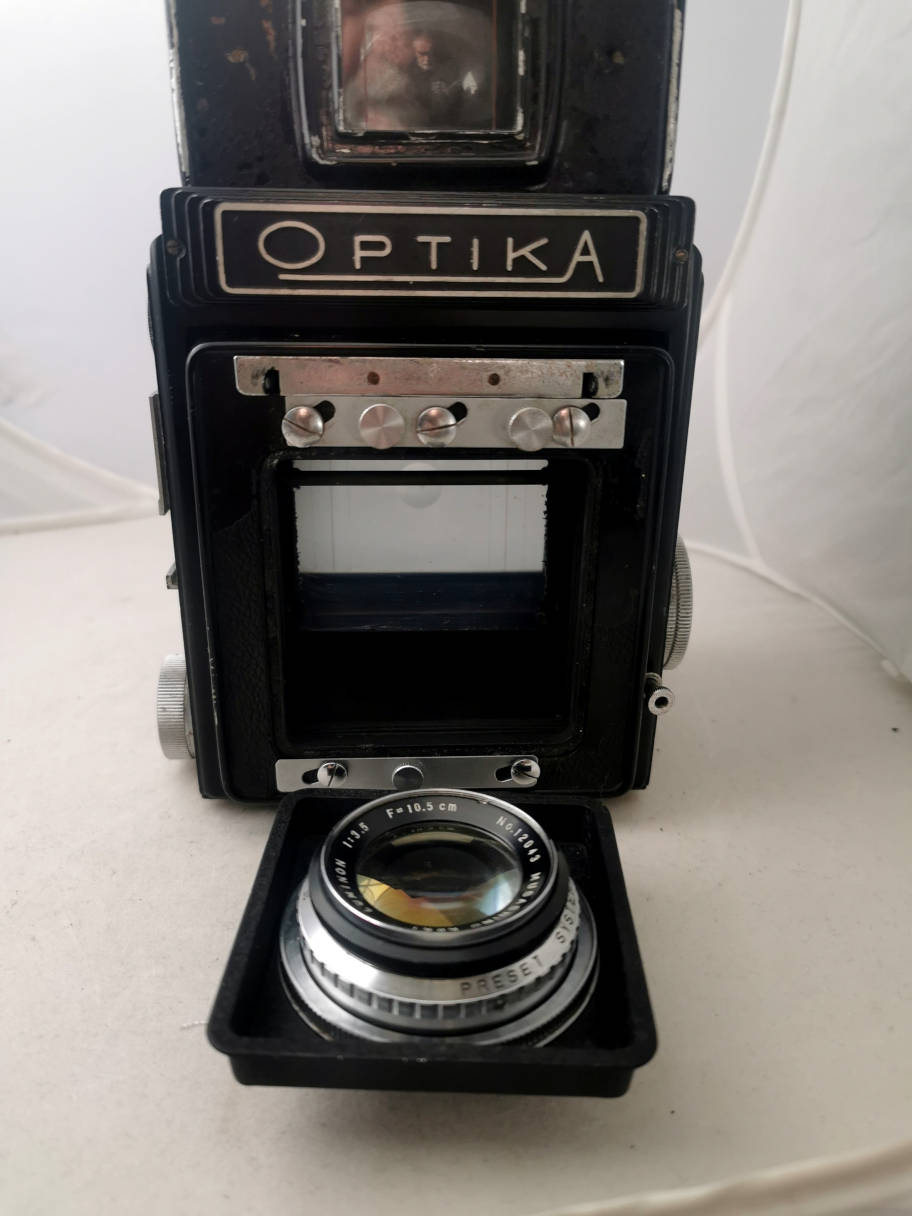
Lens taken off. It's held by 2 sliders. Do not touch the mirror. You
can unscew the lens, turn the lensboard and rescrew. It fits, you will
not reach infinity, but you can focus much closer.
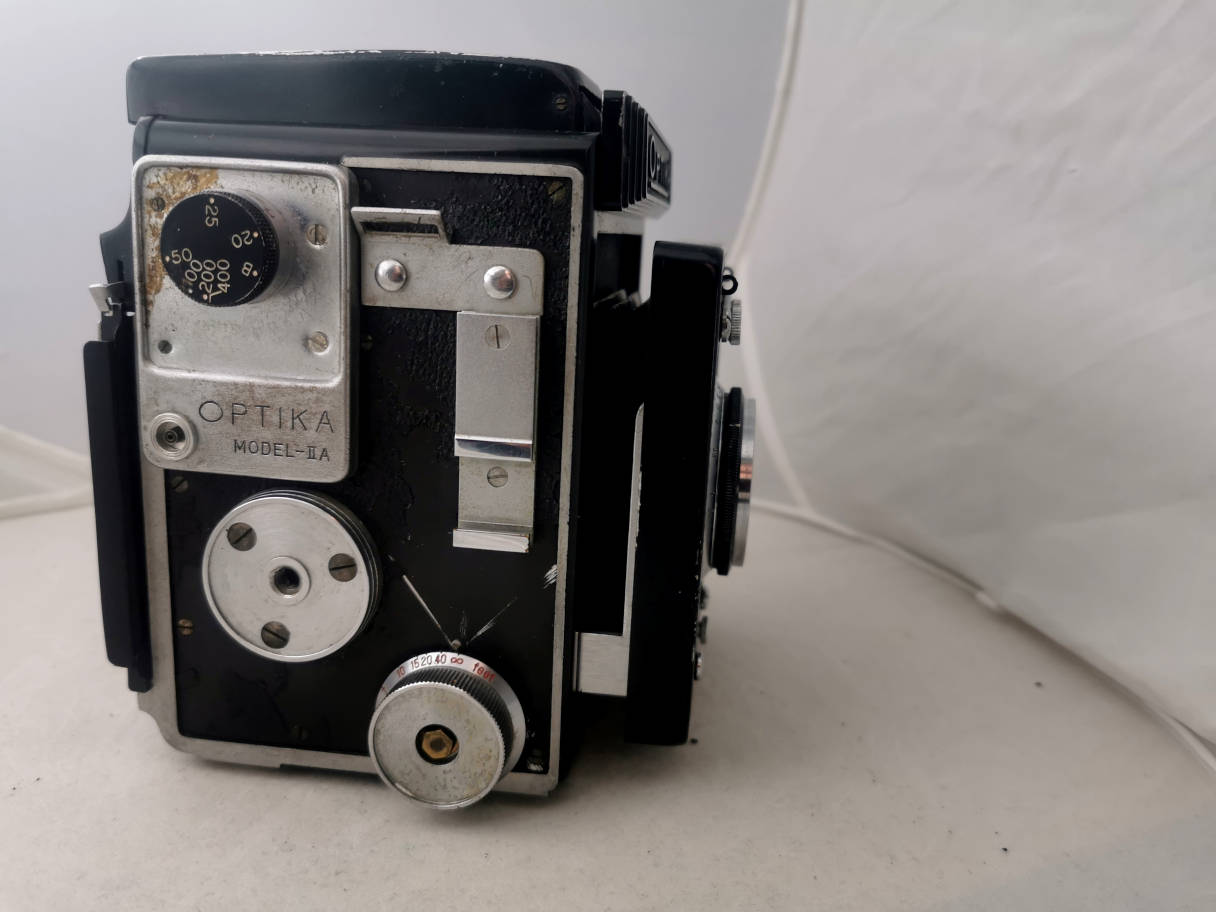
Focussed to infinity.
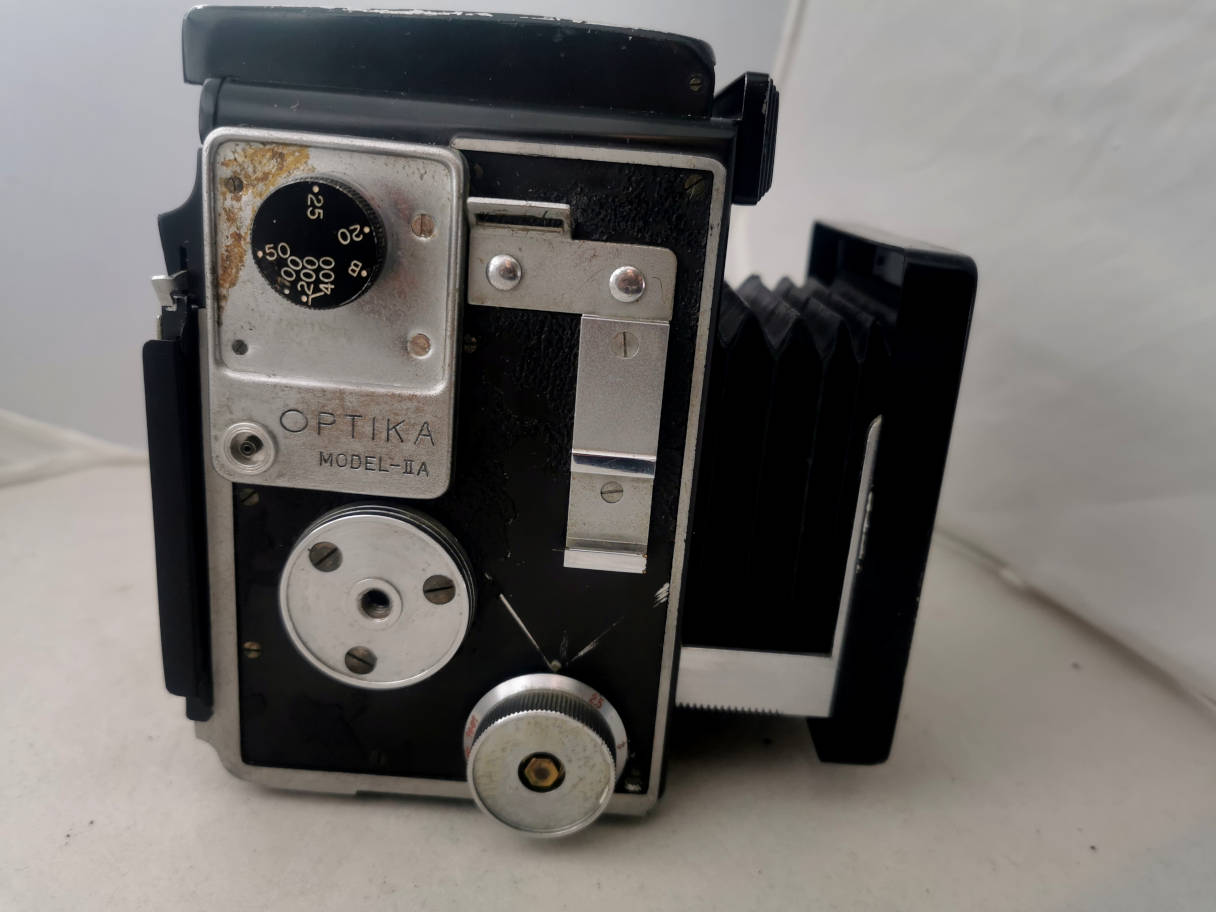
Closest focus, less than 2.5 feet, about 70cm.
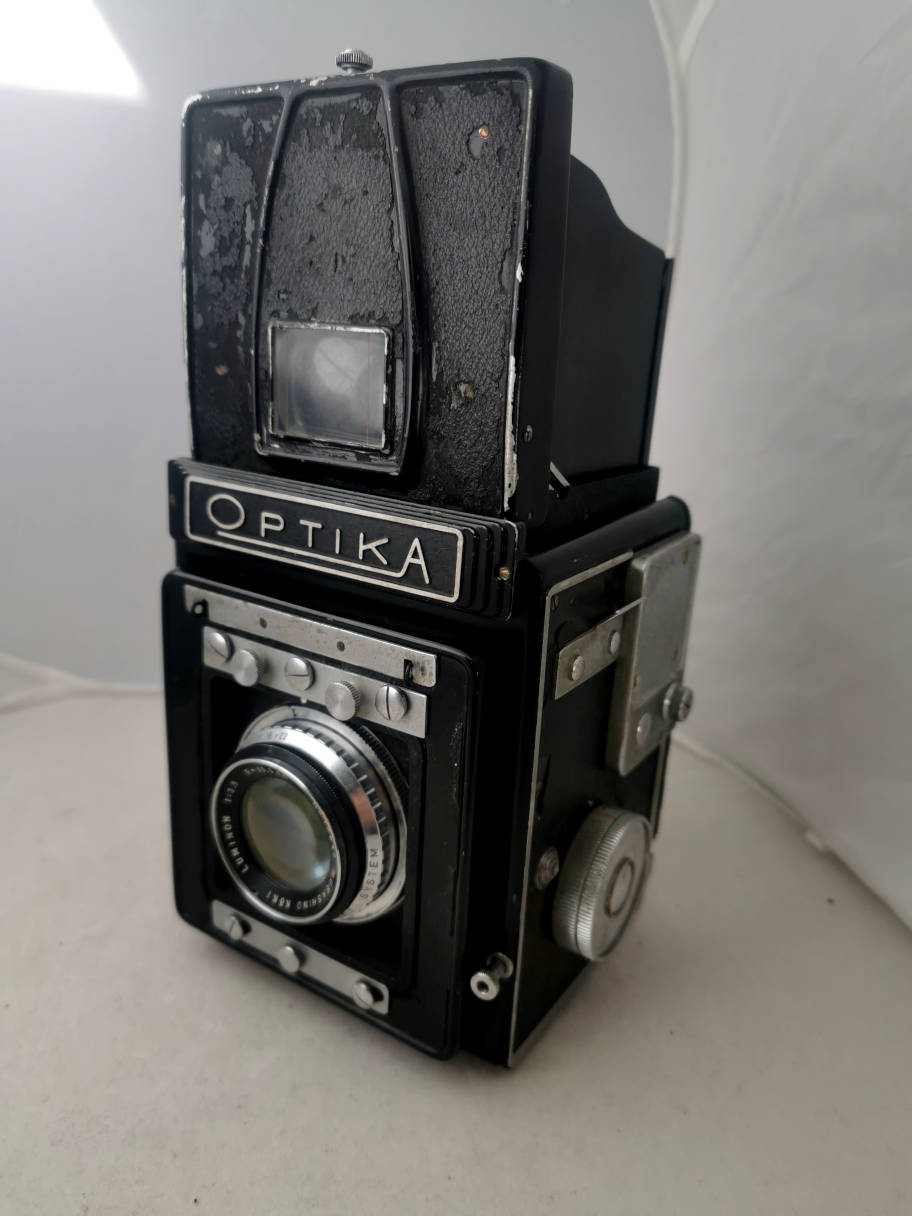
Camera and standard folding viewer. The viewer is screwed to the body. There was a reflex viewer available.
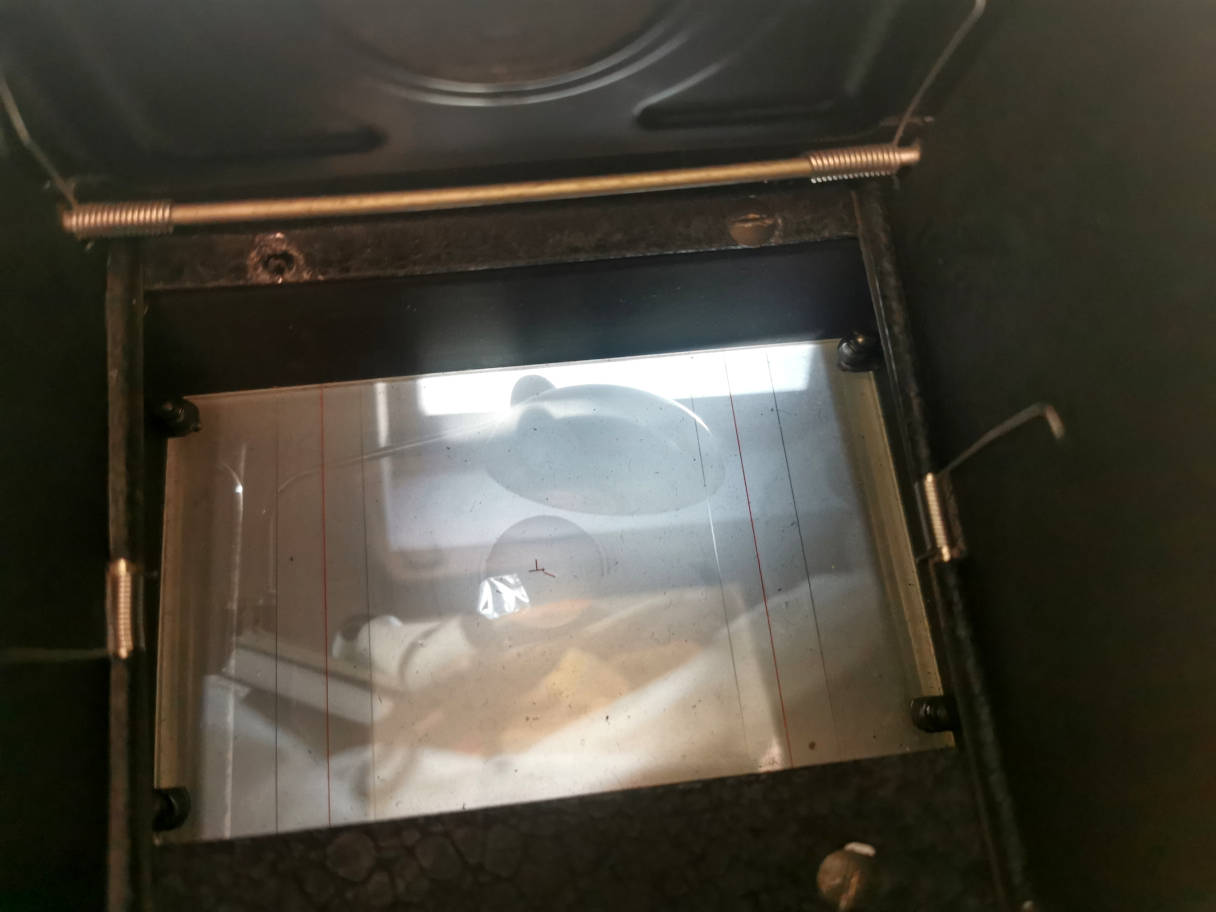
Ground glass with Fresnel spot and lines for all formats.
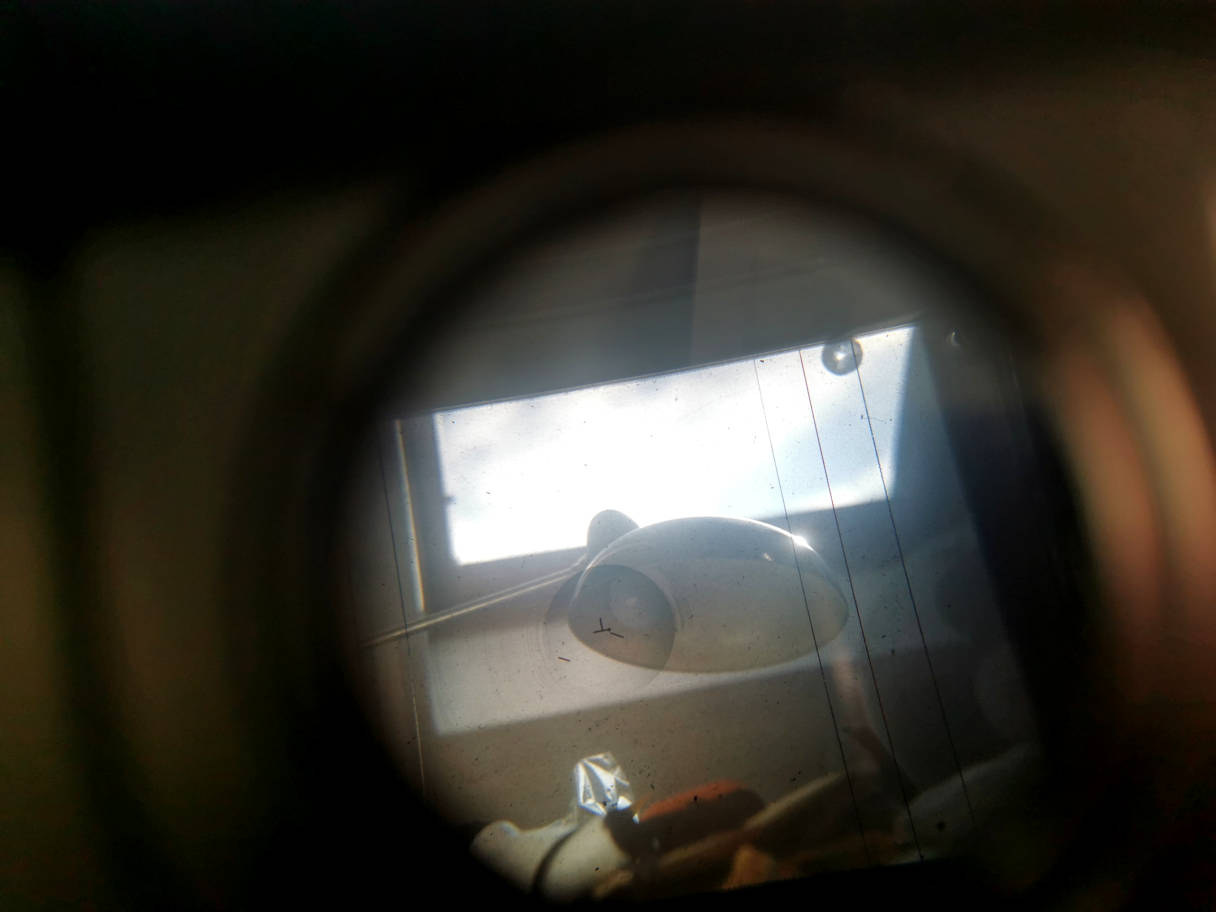
A foldable loupe is provided.
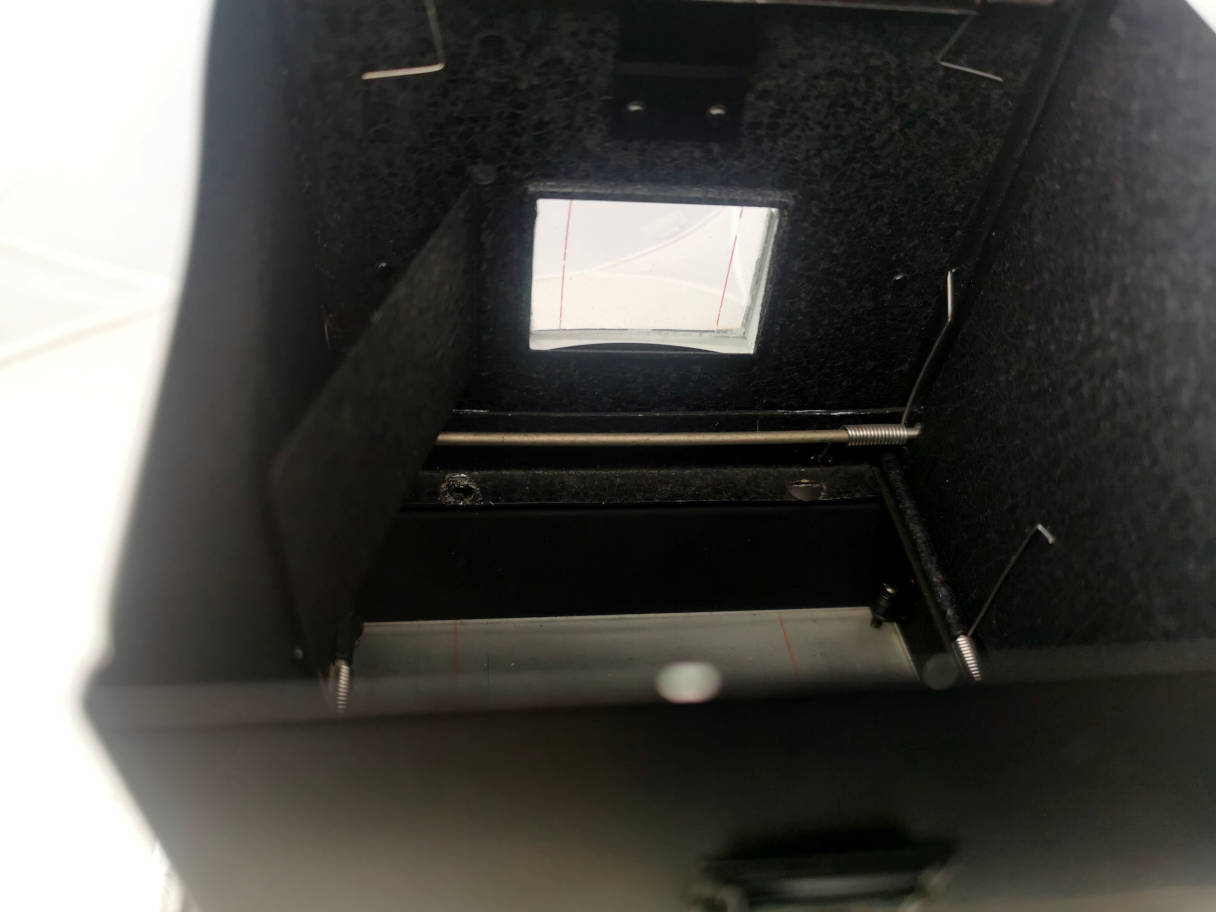
If you lift the loupe, there is a gate that opens the lens of the
sports finder. You have to peep through the little hole visible at the
bottom of the photo. Lines for 6x6 format are present.
I have a second Optika IIa body in much better condition which has the flap.
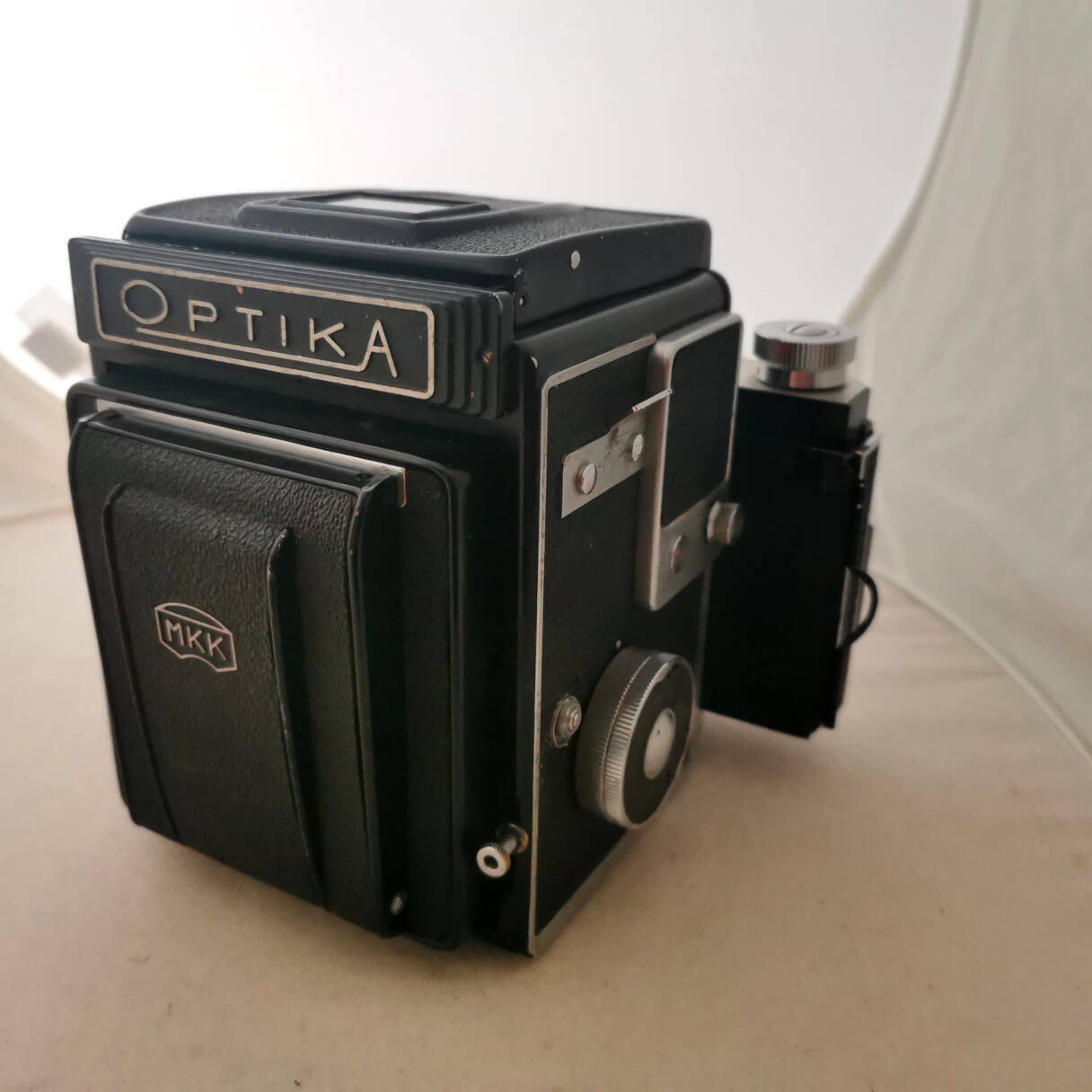
Front and right side.
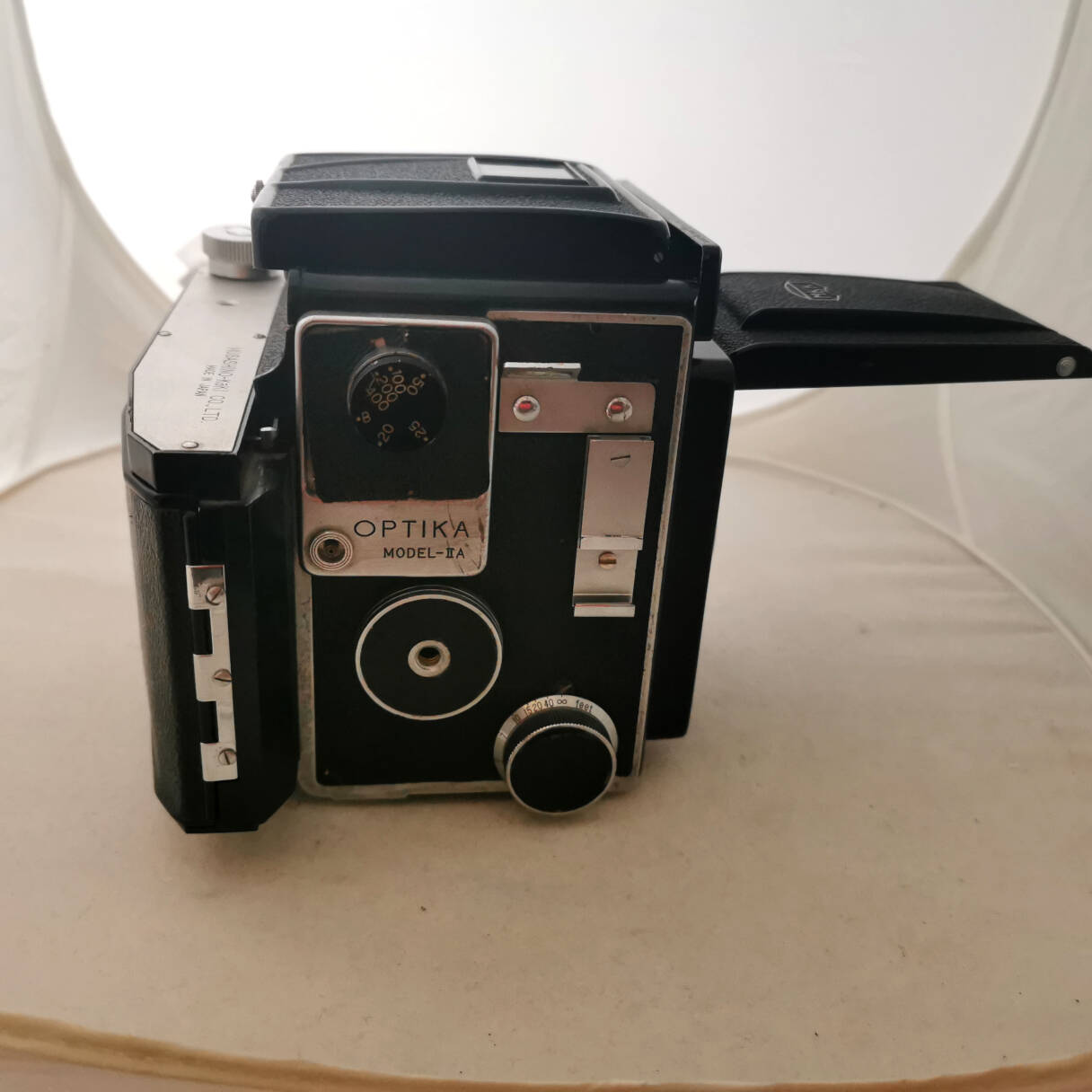
Left side.

Back and left side. A 6x9 roll film holder attached.

Front.
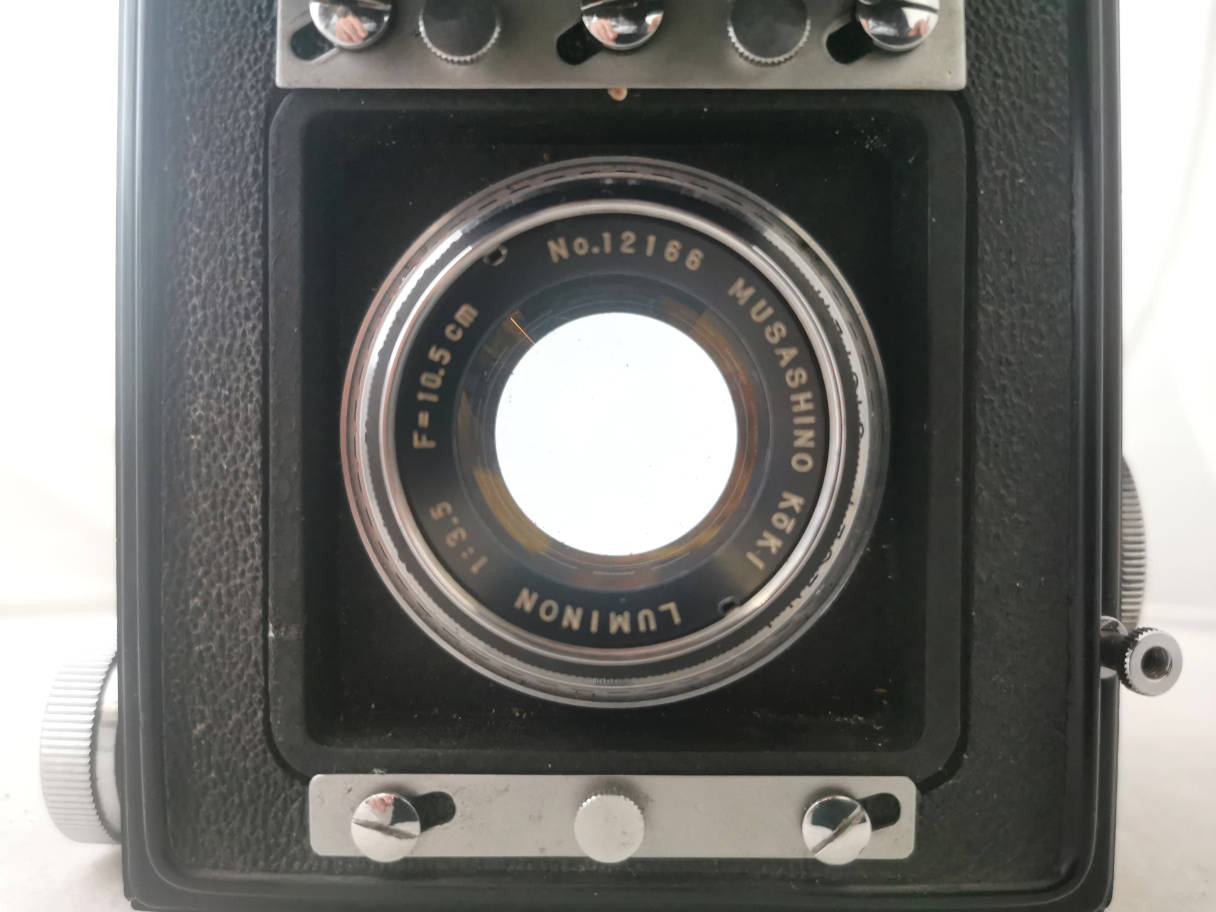
The Luminon has a similar number rage as the first one.
Aperture open for focussing...
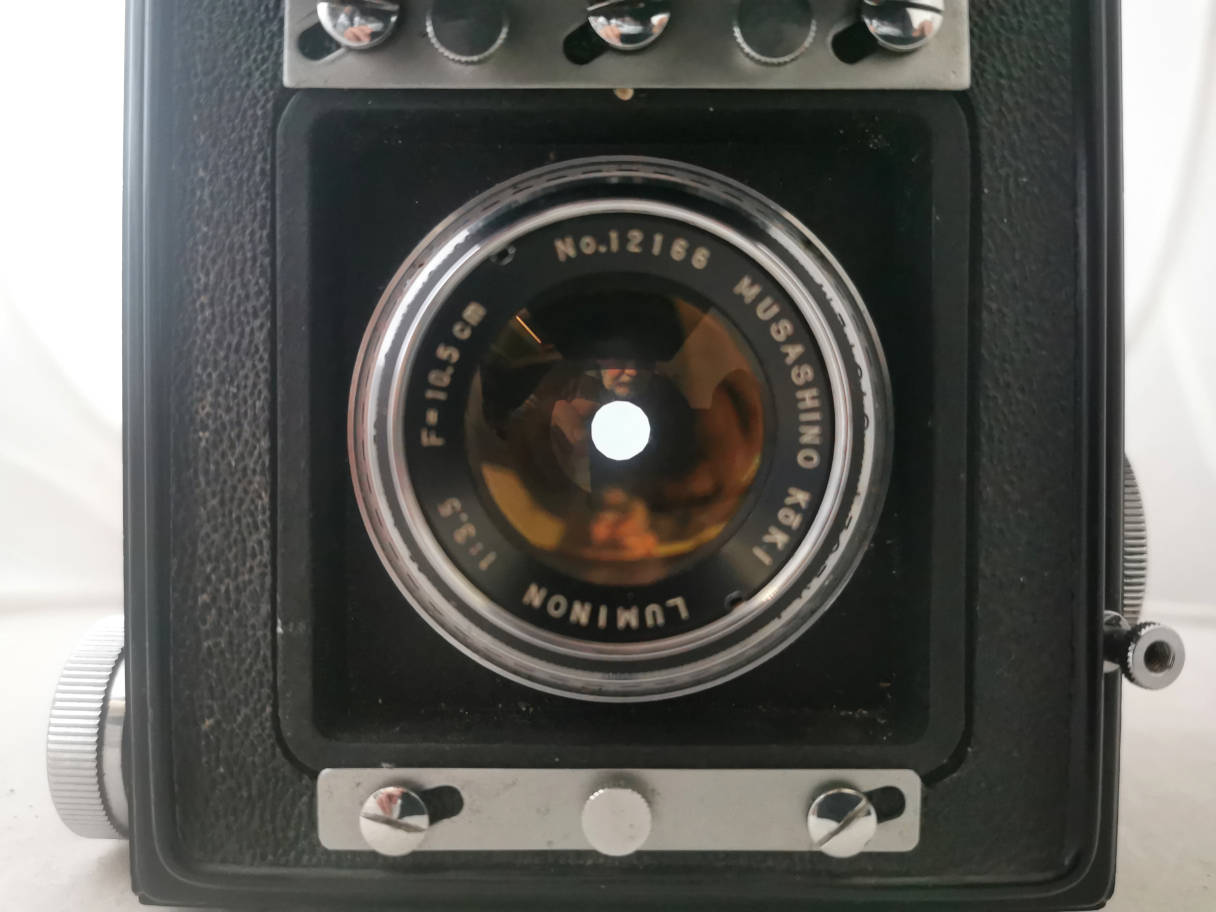
...and stopped down to the preset aperture.
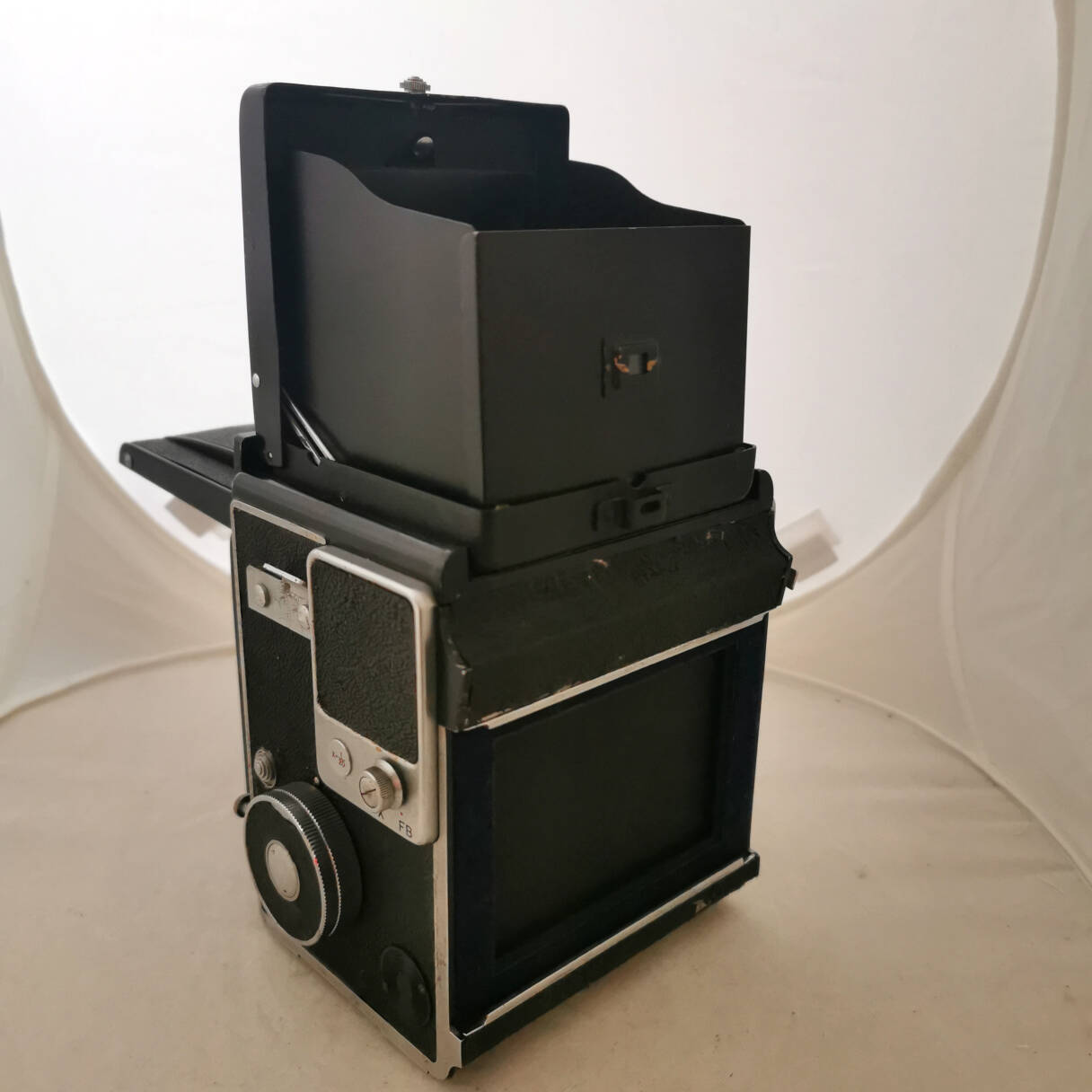
Back detached.
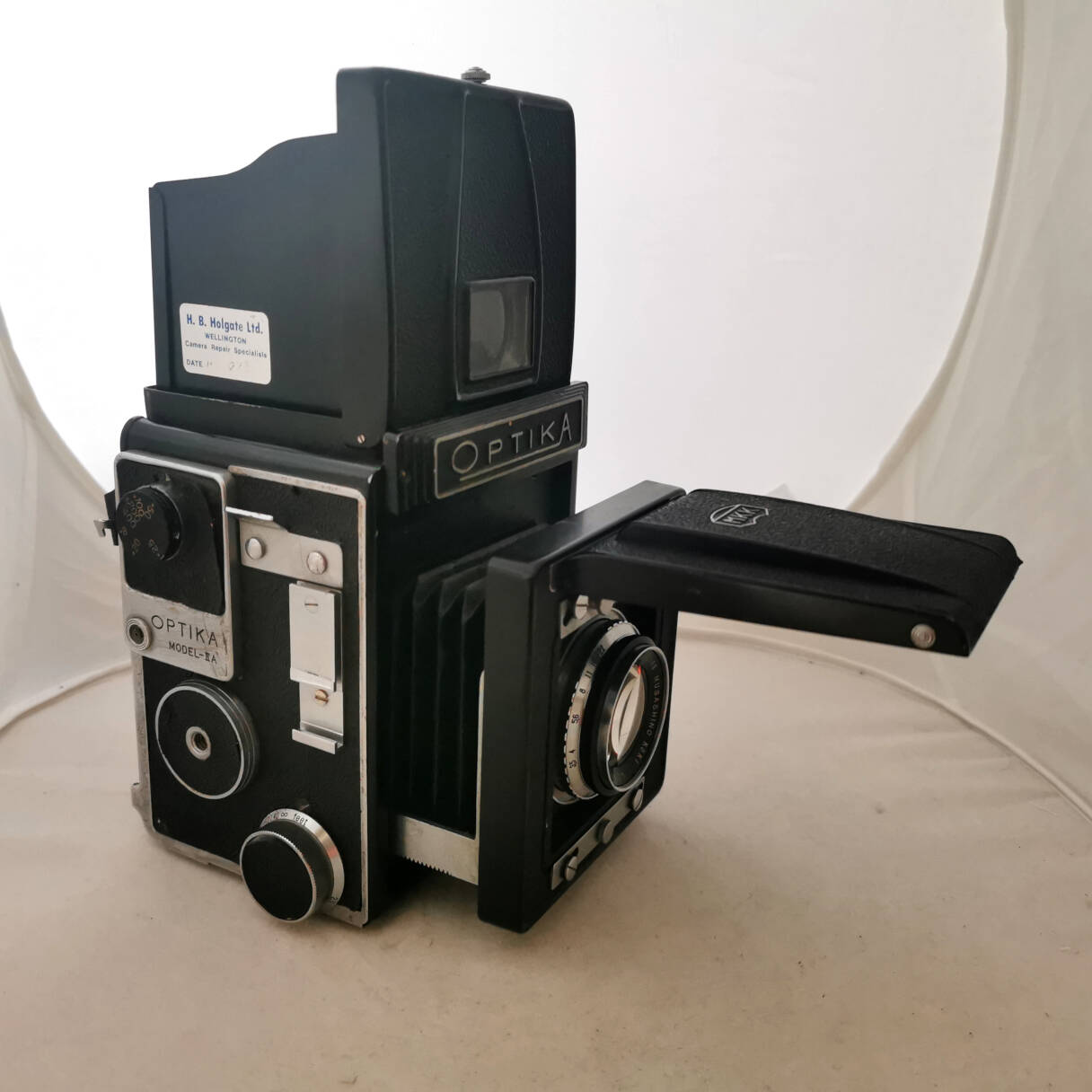
Focussed to infinity. It comes from a similar number range as the first one.
A third one.

Serviced as well. As it has no flap, I put the 18cm lens.
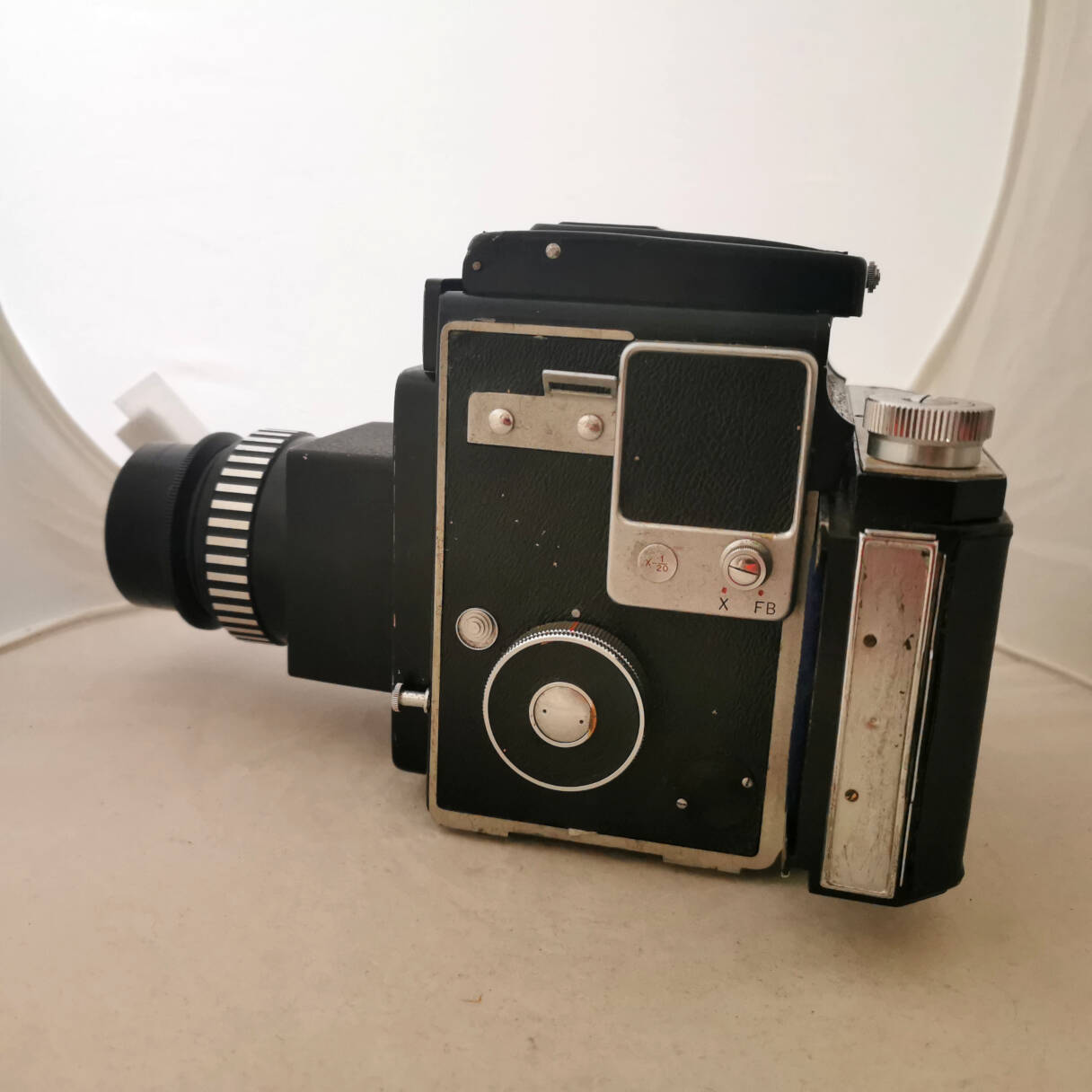
Left side.

Front.
And the Rittreck S-P body with the slow speeds, shutter not working, without folding finder.
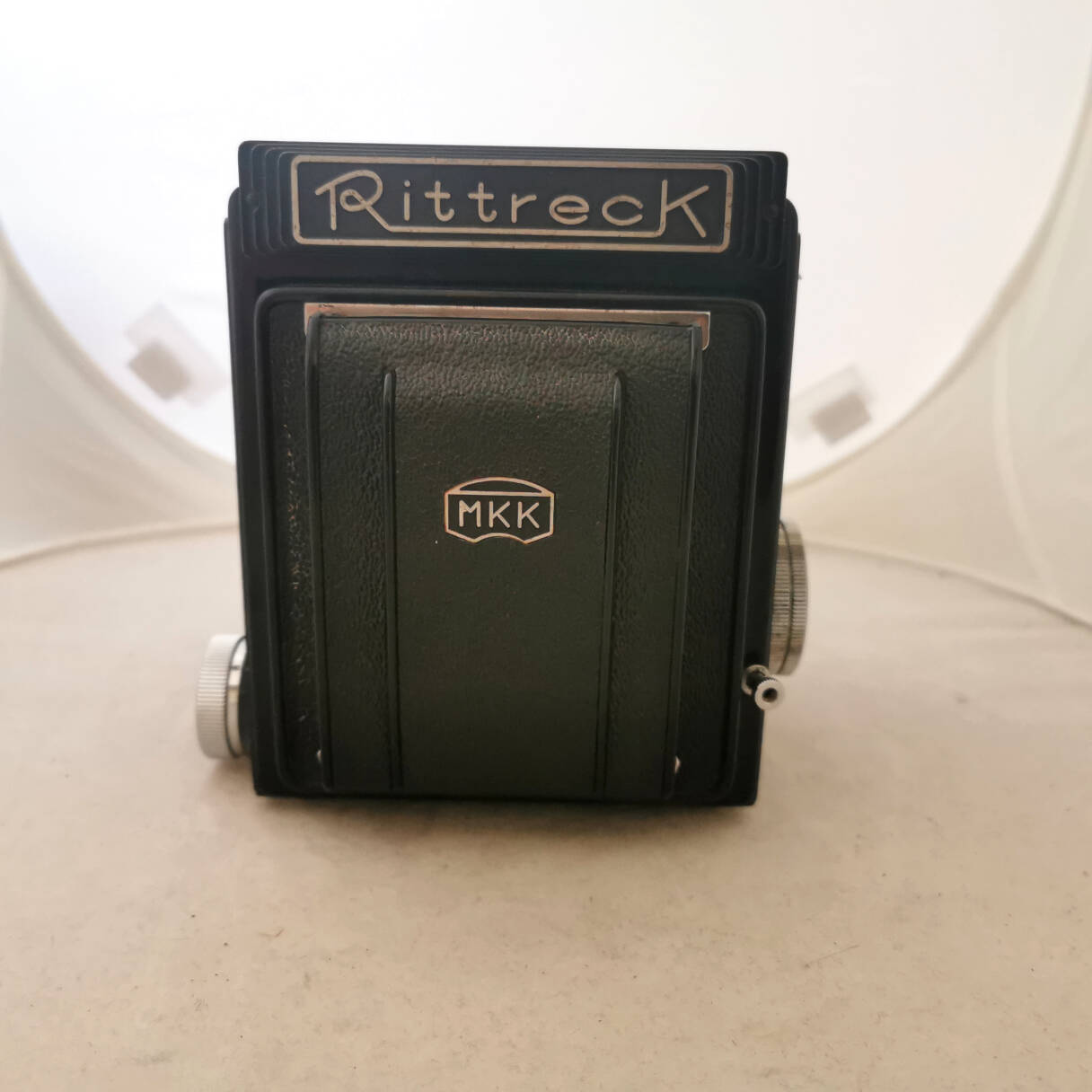
Front with flap. Rittreck inscriptions. No viewer hood.
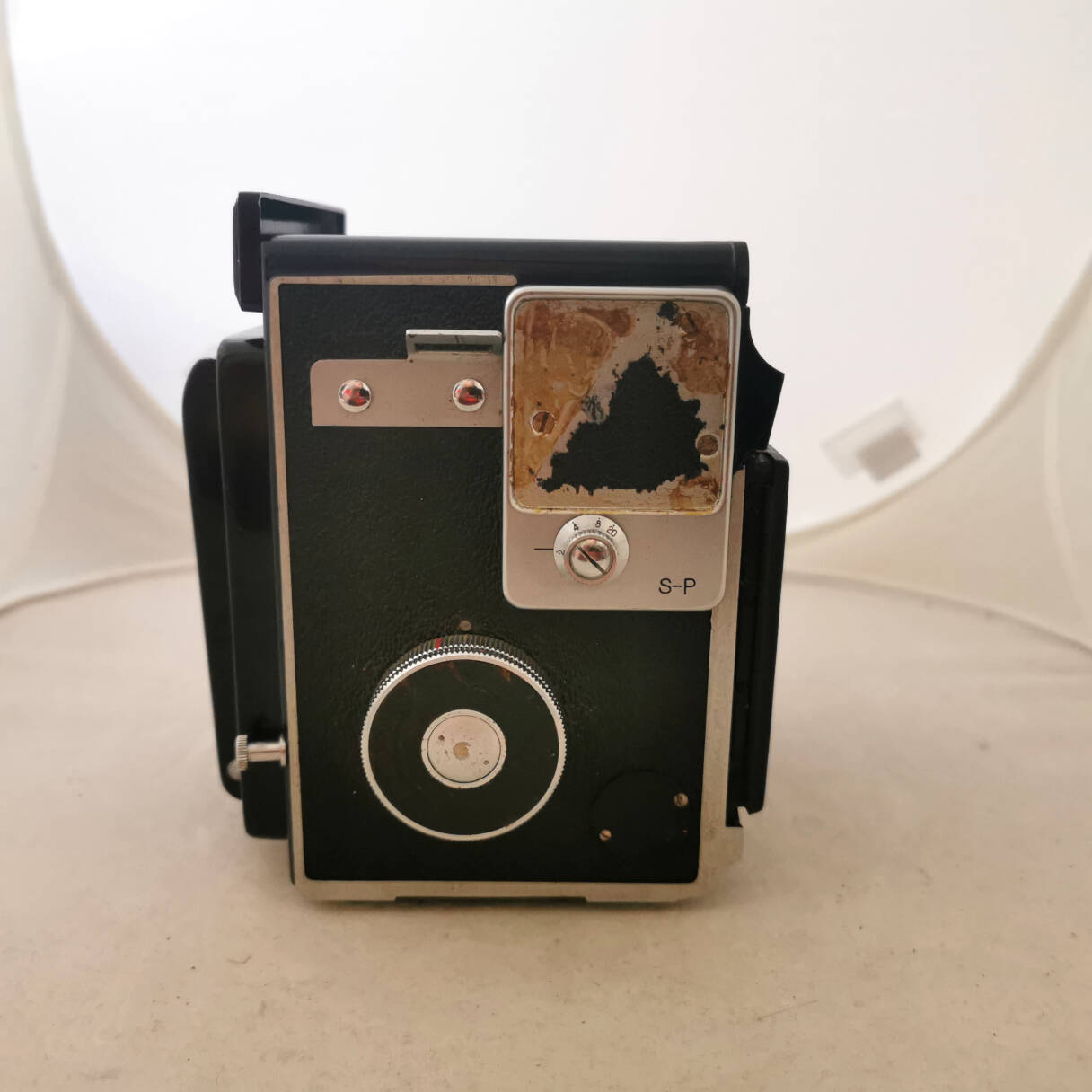
Right side. No lever to block the shutter release, turn the
button to either side and it will stay pressed in. Slow speed dial.
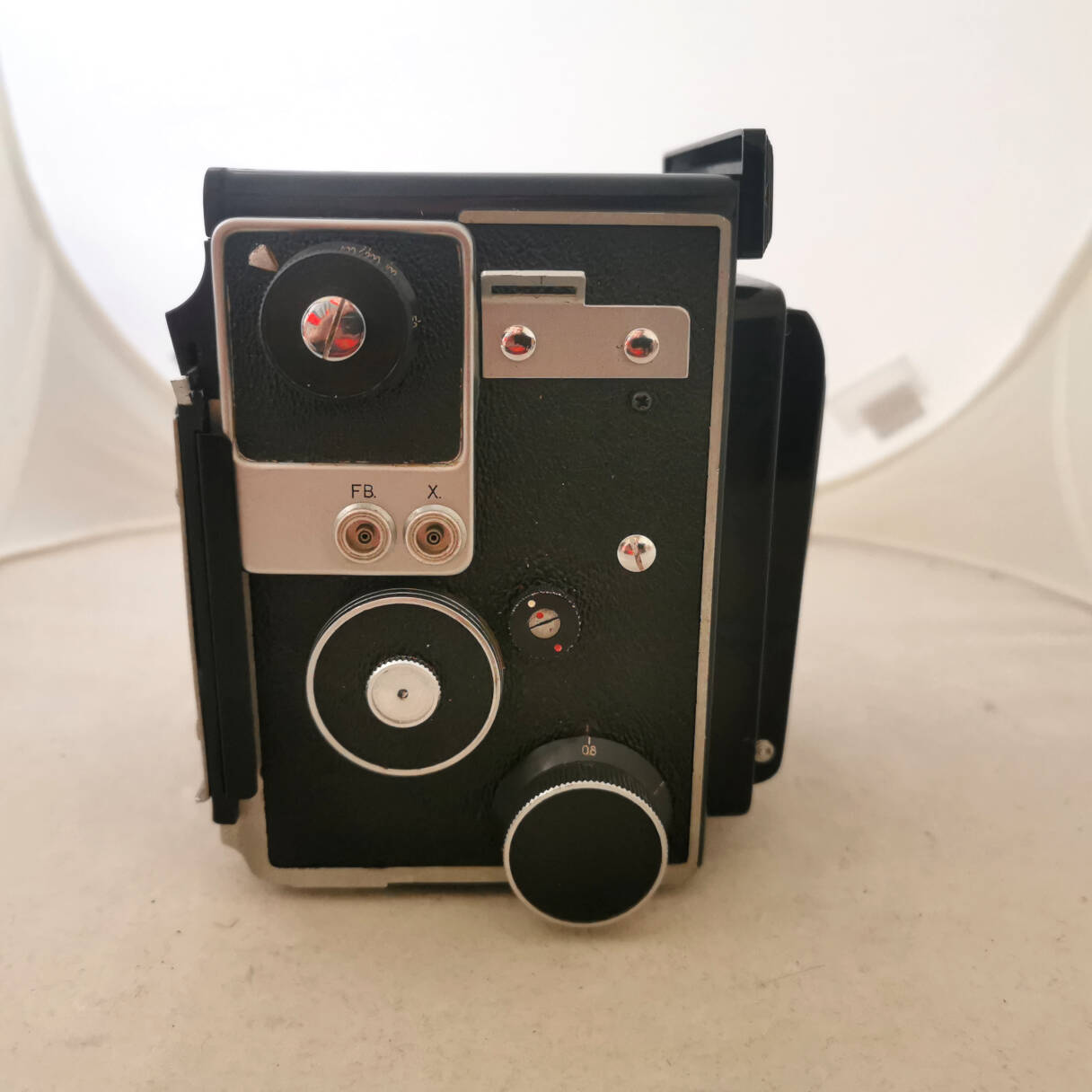
Left side. Speed dial and 2 different PC flash sockets. Mirror device. Focussing knob with distance inscriptions.
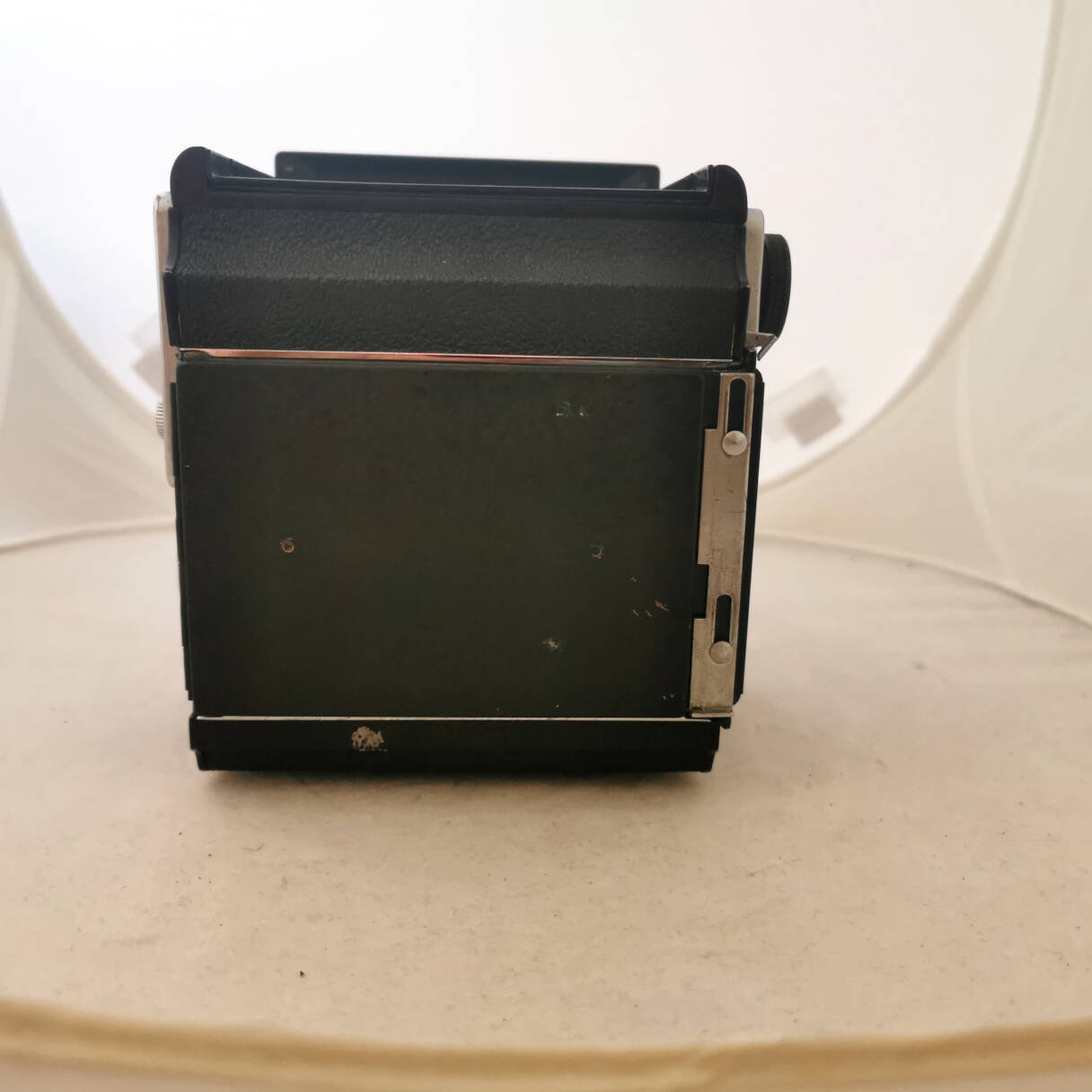
Back with sheet film holder.
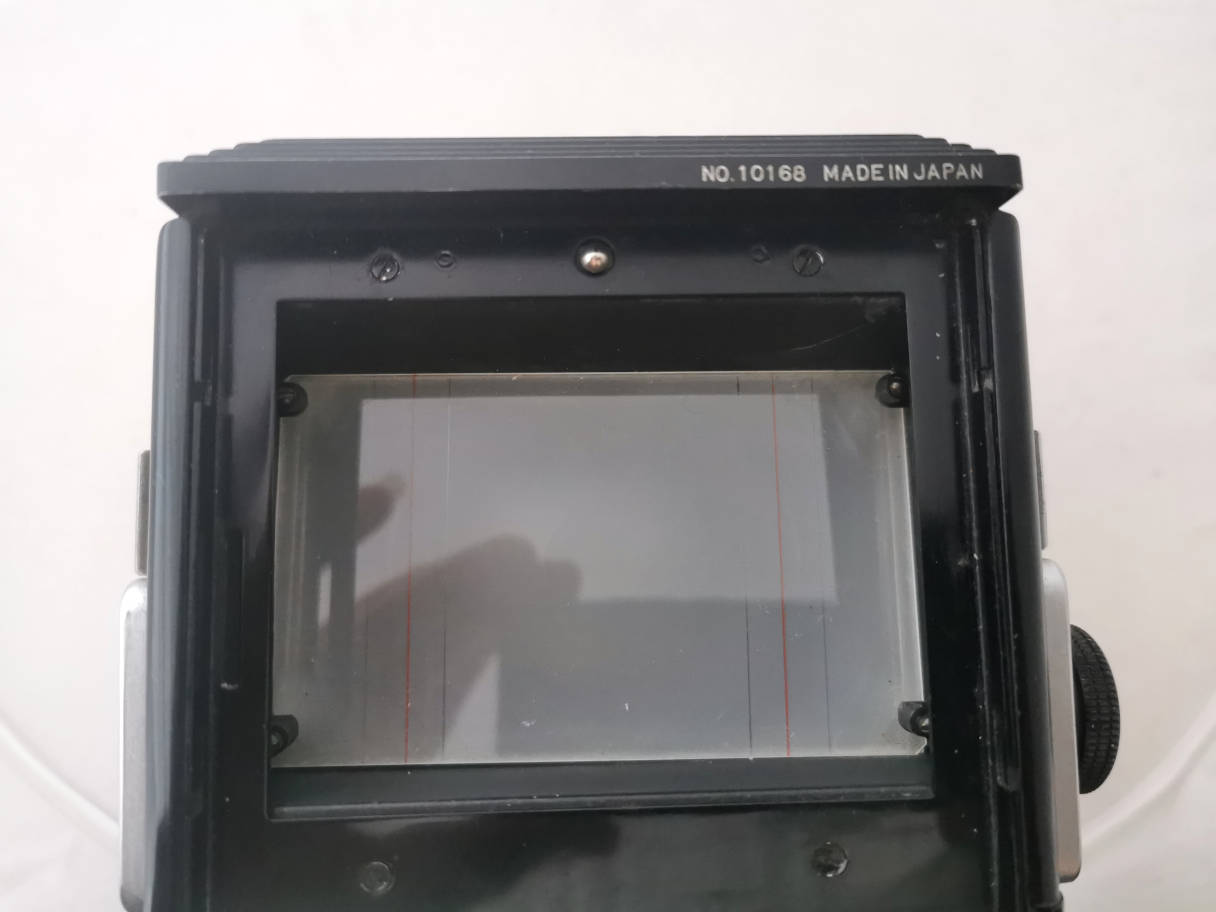
The screen. Obviously the system to fix (and change) the viewer has
been altered. There are slots on both sides to insert a viewer and a
little spring-held ball towards the front to lock it. No screws
anymore. The camera can well be used without the folding hood. The
screen is luminous.
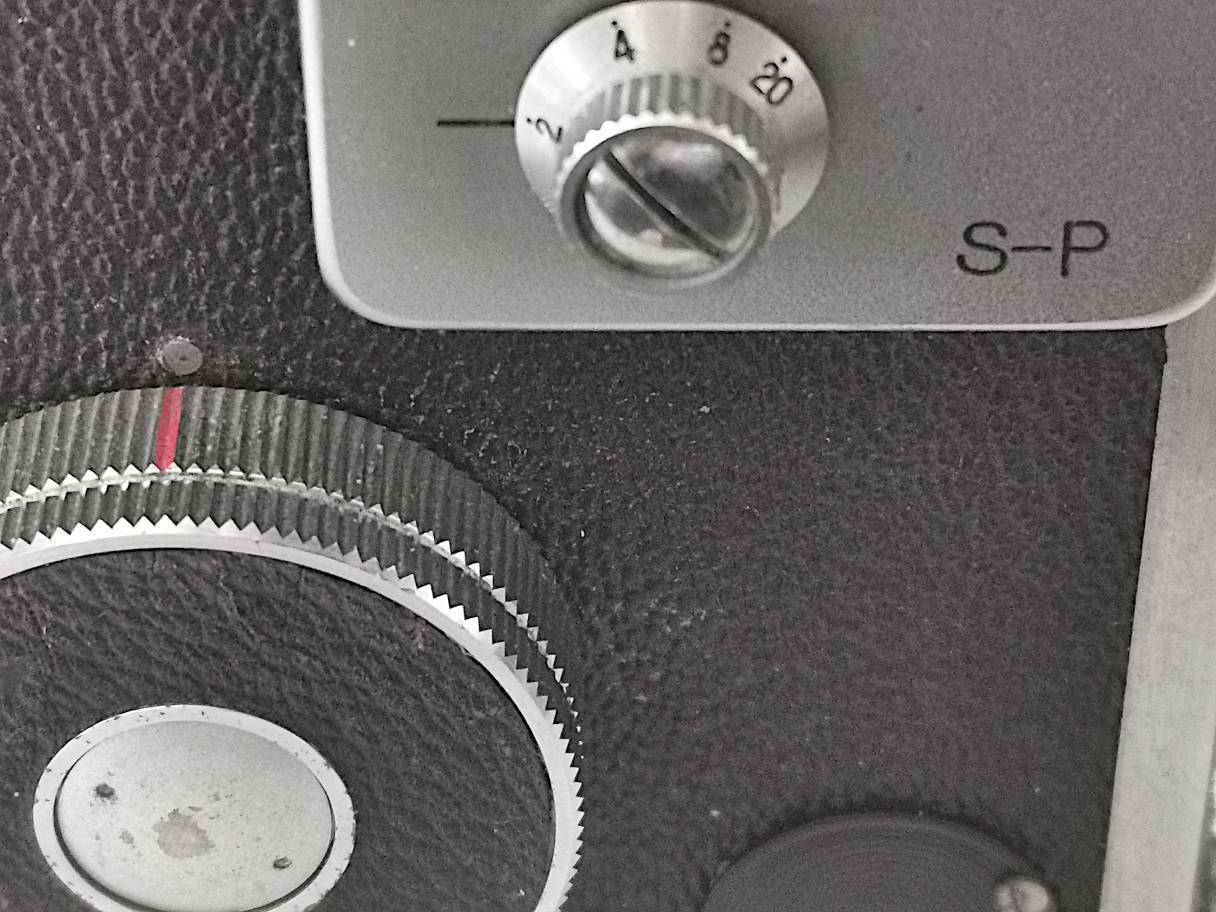
The slow speed dial. You have to set the ordinary dial to 1/20 and then the slow speed dial to the desired speed.
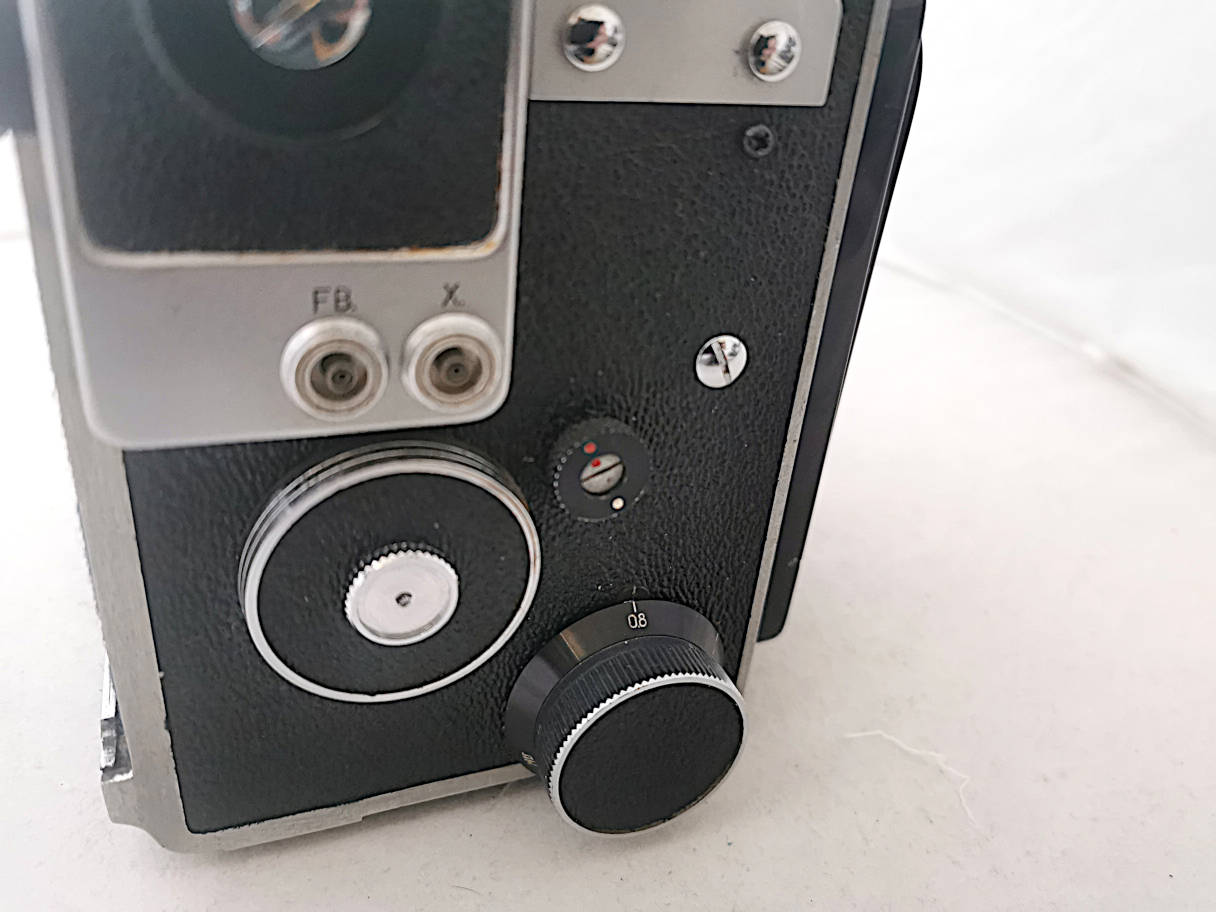
As the mirror
is dampened on this camera, there is a special device for taking
vertical photos, you have match the white point on the ring with the
red inner point. Do not forget to set it back.
A few photos of the roll film holders. This is a type I holder, it has no removable insert and no automatic stop. It allows
3 formats (with masks for the smaller formats): 10 pictures 6x7cm, 12
pictures 6x6cm or 15
pictures 4.5x6cm per roll of 120 film. It
has 3 film counters on the top of the holder, one for each format. Film
advancing is made by turning a knob and watching the
corresponding counter window. I do not have the format masks yet.
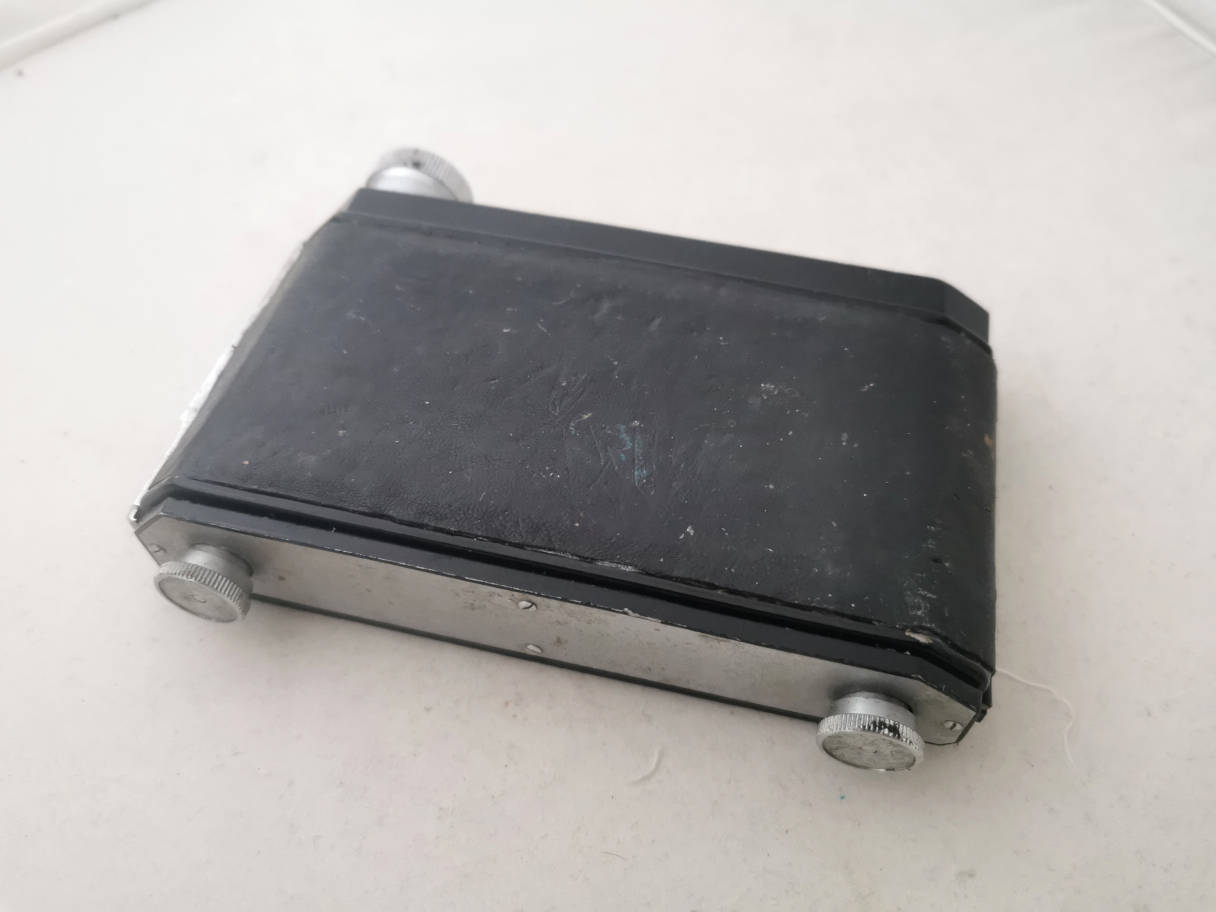
Holder deposed.
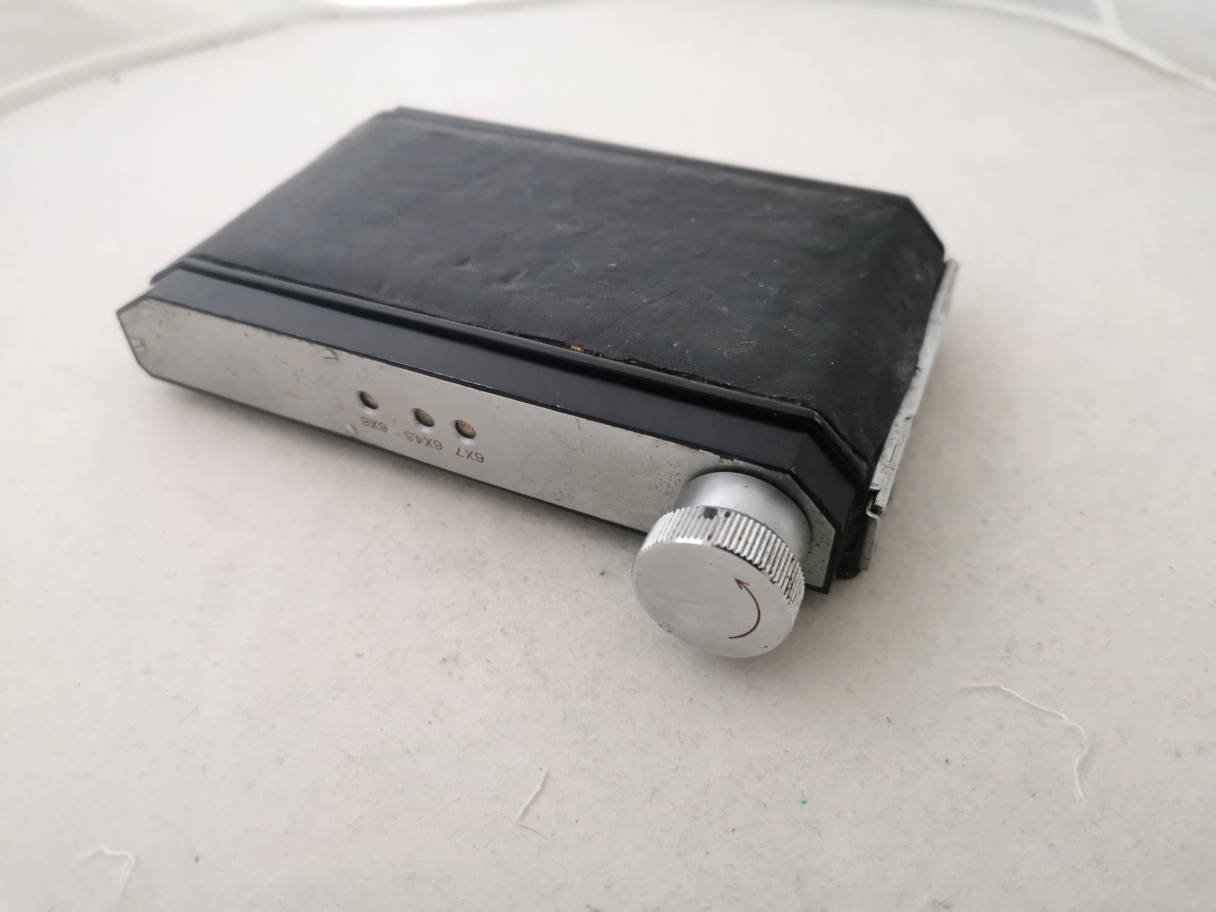
Wind knob and counters.
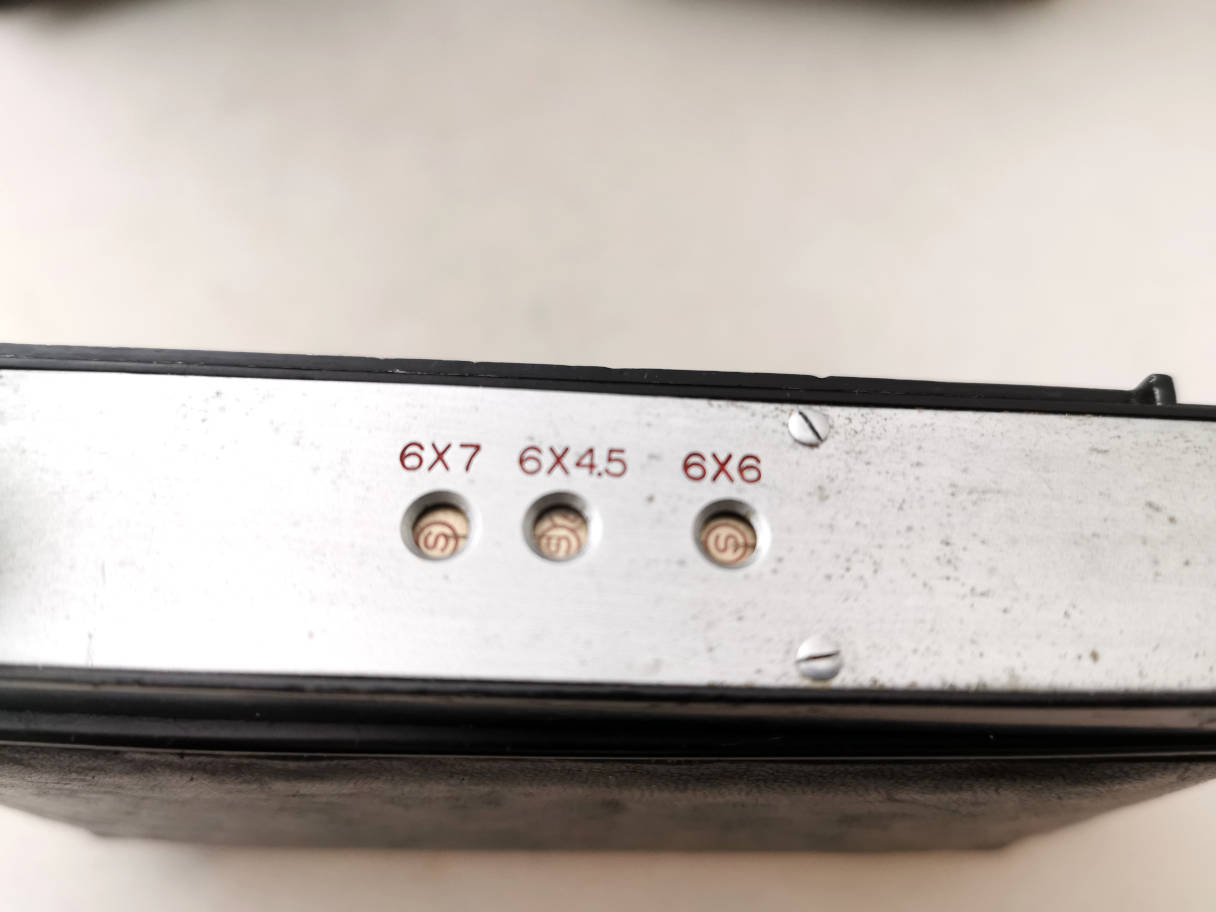
If you open the back, all counters set back to "S" for start,
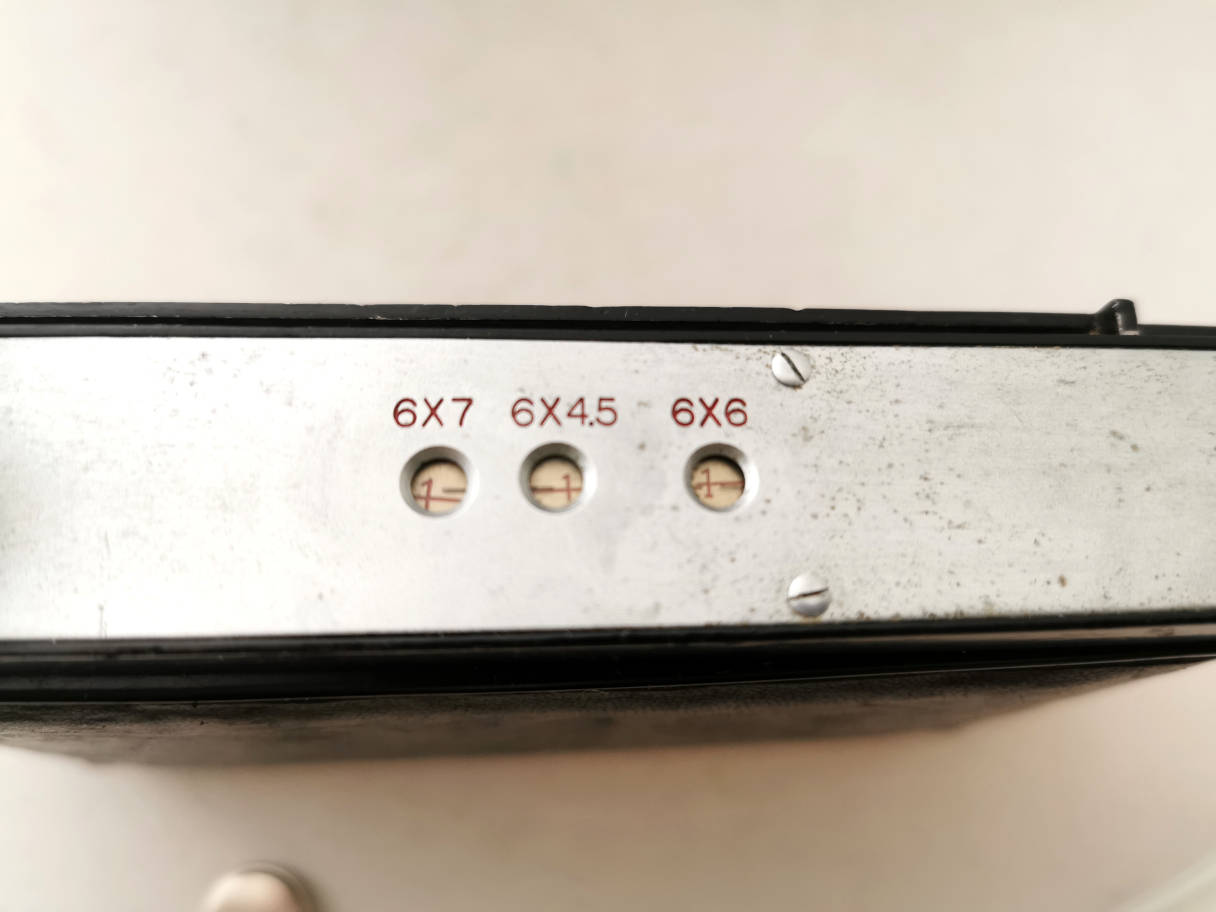
After film loading and closing the back, advance to "1". It's the same
for all formats. Do not forget the corresponding format mask. Then only
watch the counter for the chosen format.
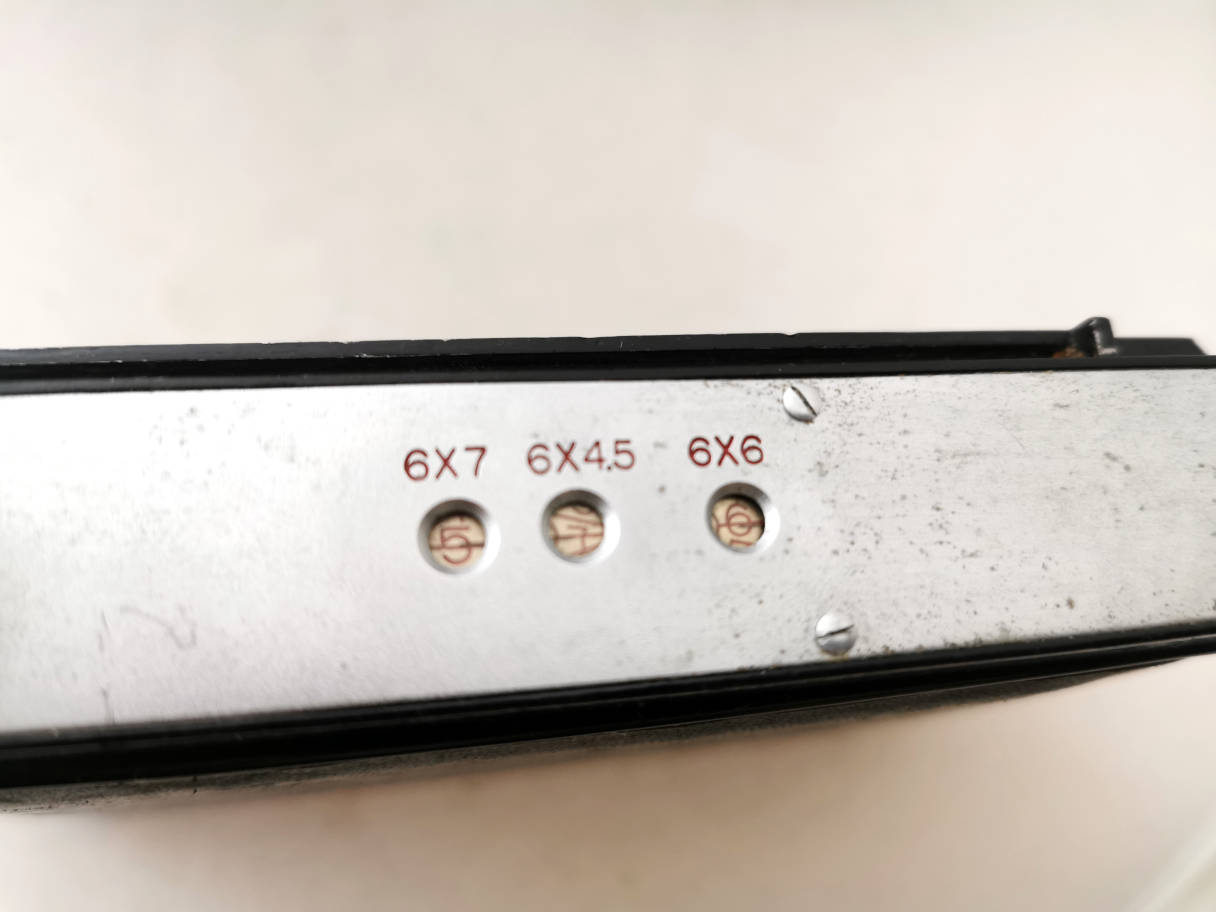
As you can see, it's the fifth photo for the 6x7 format, the 6th for 6x6 and the 7th for 4.5x6.
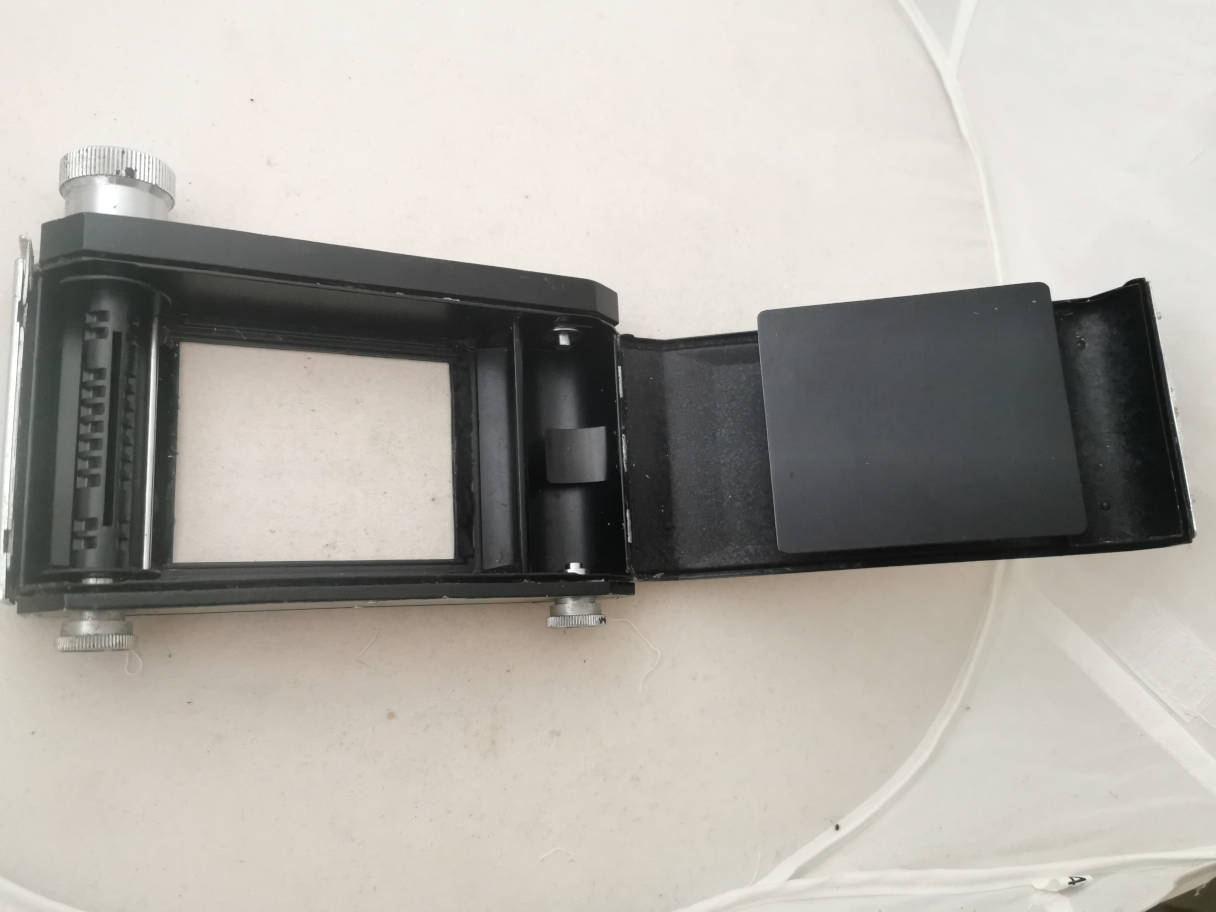
Holder open. the pegs on the bottom retract.
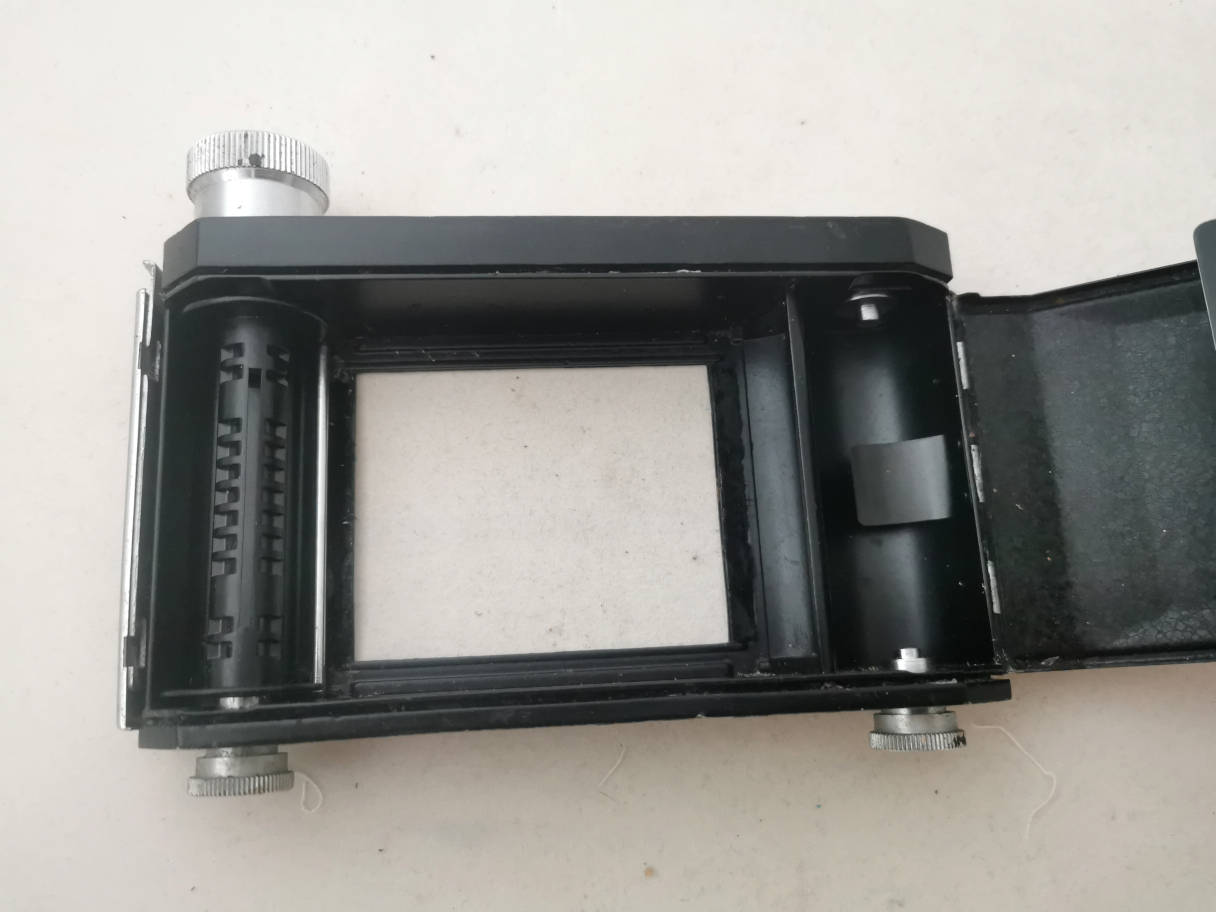
The Rittreck roll film holders have one major inconvenience: the
exposed 120 film is wound with the backing paper on the inside of the
spool and
the light sensitive film side on the outside. So there is no
information about the type of film visible from the outside of an
exposed roll of film. Keep this in mind.
Take the film spool so that it unrolls to the left and the printed side is towards you.
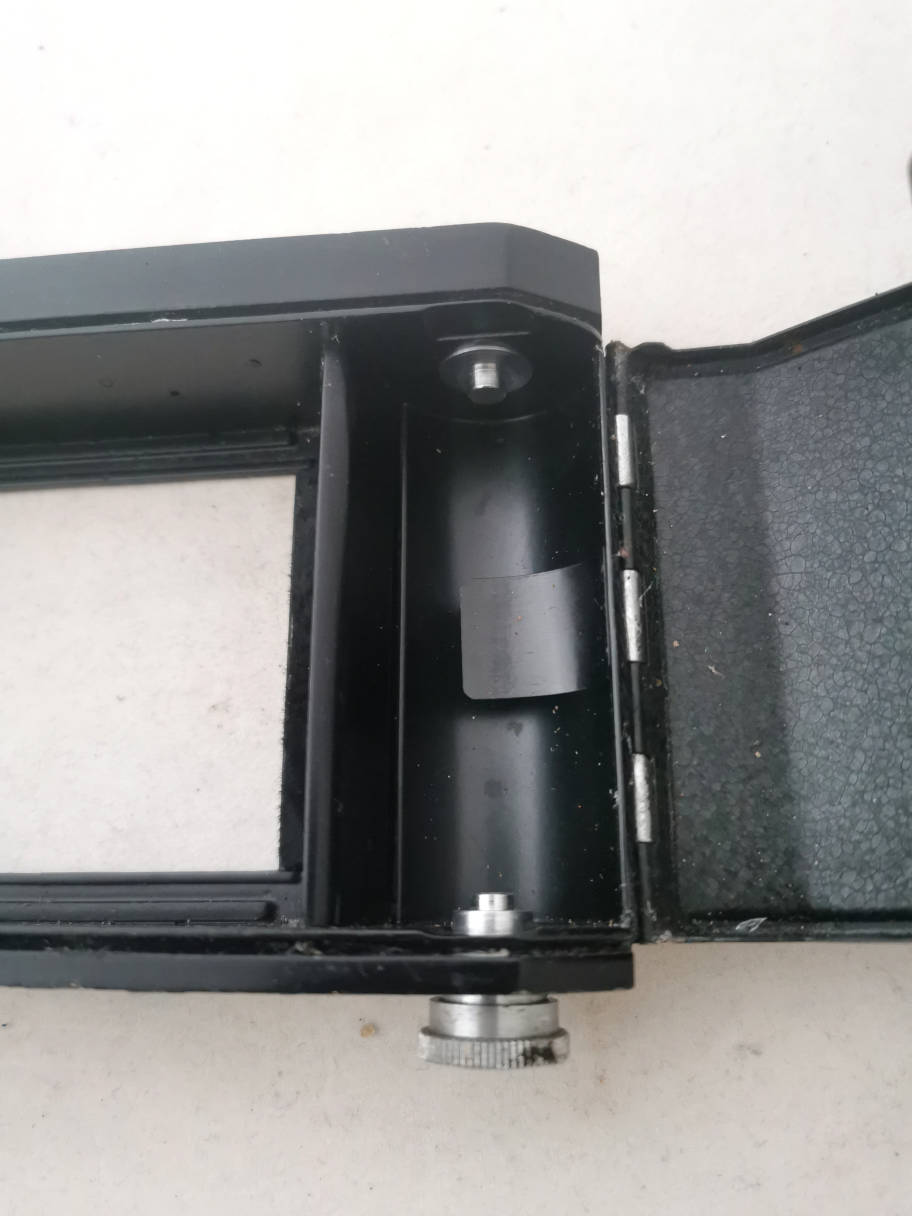
Insert the film leader into the slit and pull it towards the film plane. Insert and fix the spool and pull further.
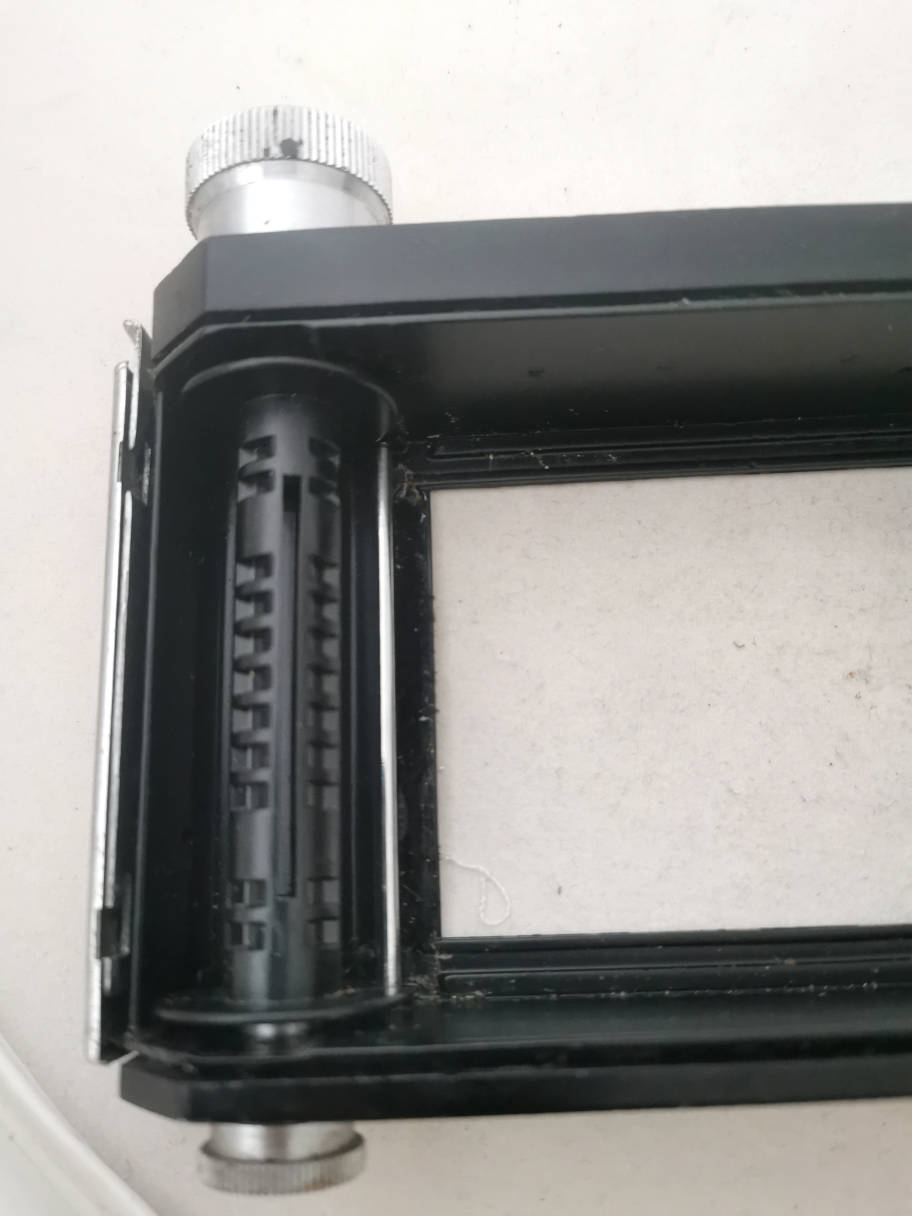
Put the film leader under the little silver roller, push further and
insert it into the wind spool. All across the film plane you should now
see the printed side of the paper whereas on the spool you see the
black side. Wind until the start arrow meets the little silver roller
and stop. Close the back. Fix it to your camera and wind until no. 1 is
visible in the counter, there is no stop. Ready for the first photo.
When all photos are taken, wind further until an "E" will show. The
rolls are more prone to fogging, as there is less backing paper to
protect the film. Only unload in subdued light and protect the exposed
roll from light.
Instructions for a type 2 6x9 roll film holder:

Match the mark on the wind knob with the mark on the holder. Only then you can take the insert out.

Insert deposed-

Push the spools towards the bottom and insert a fingernail or a tool
into the slit and take the spools out or insert your spools.
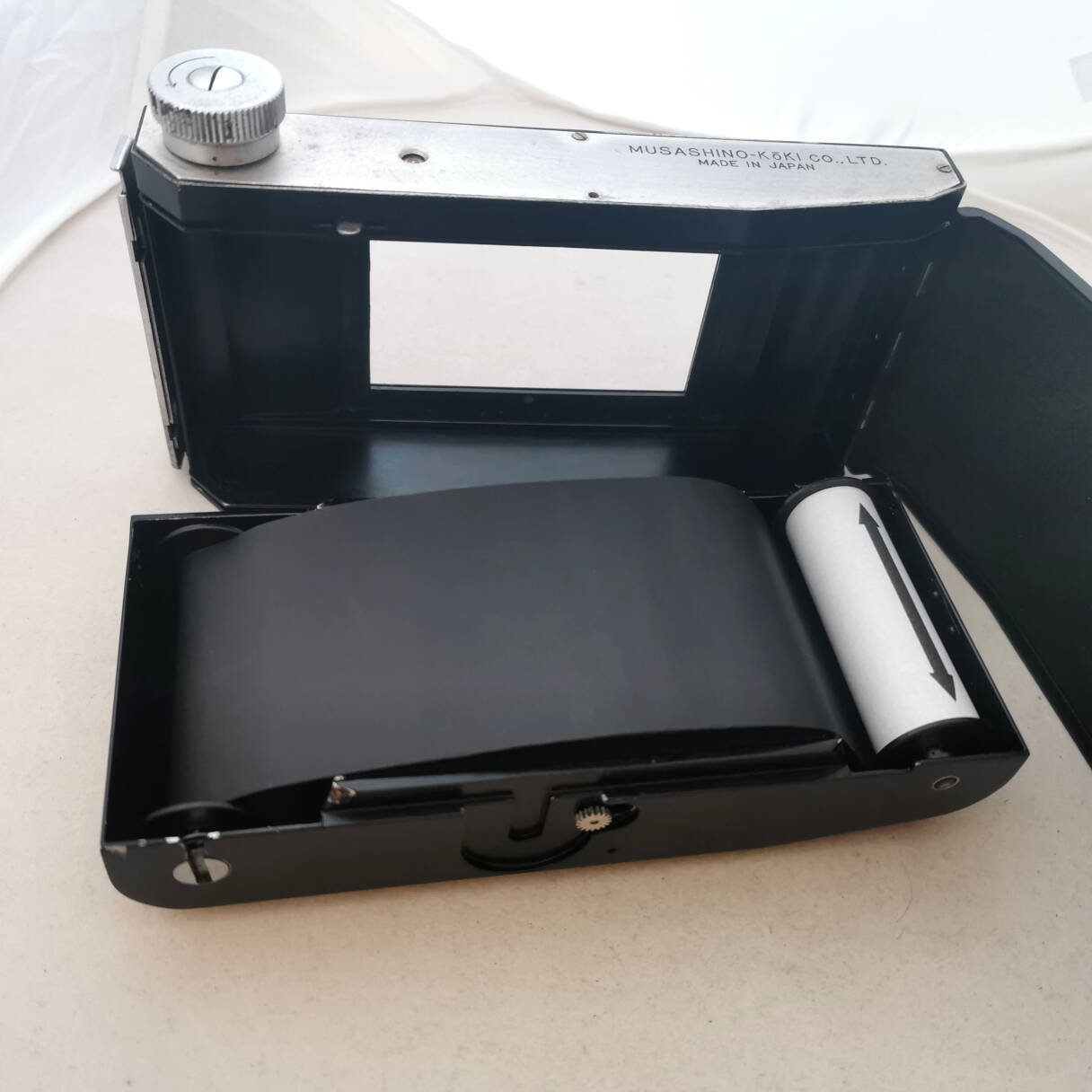
The Rittreck roll film holders have one major inconvenience: the
exposed 120 film is wound with the backing paper on the inside of the
spool and
the light sensitive film side on the outside. So there is no
information about the type of film visible from the outside of an
exposed roll of film. Keep this in mind.
Take the film spool so that it unrolls to the left and the black
side is towards you. Insert into the winding spool and wind a turn ot 2
until it is secured.
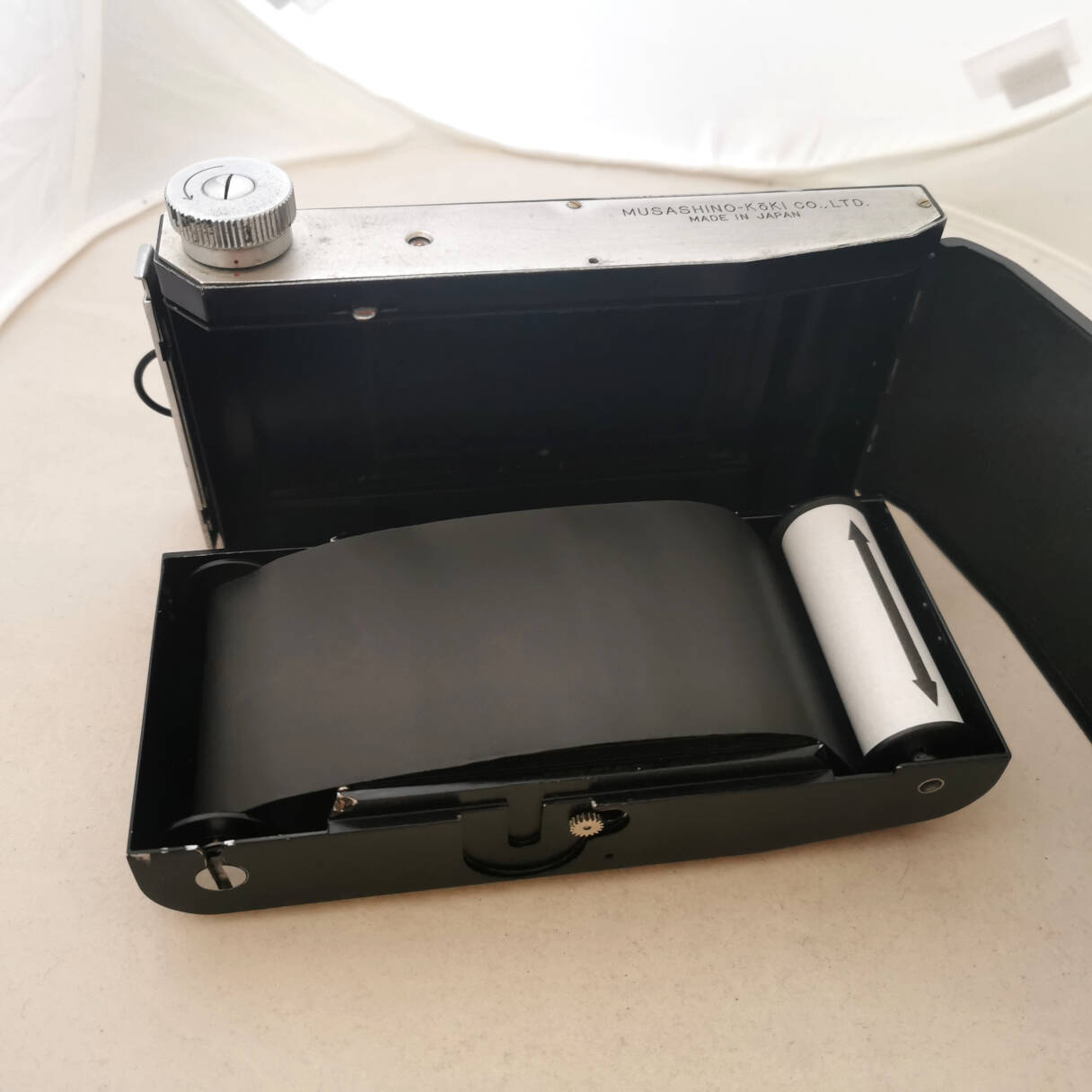
Put the dark slide if it's not inserted.

Put the insert back, look at the hole and wind until the arrow appears.
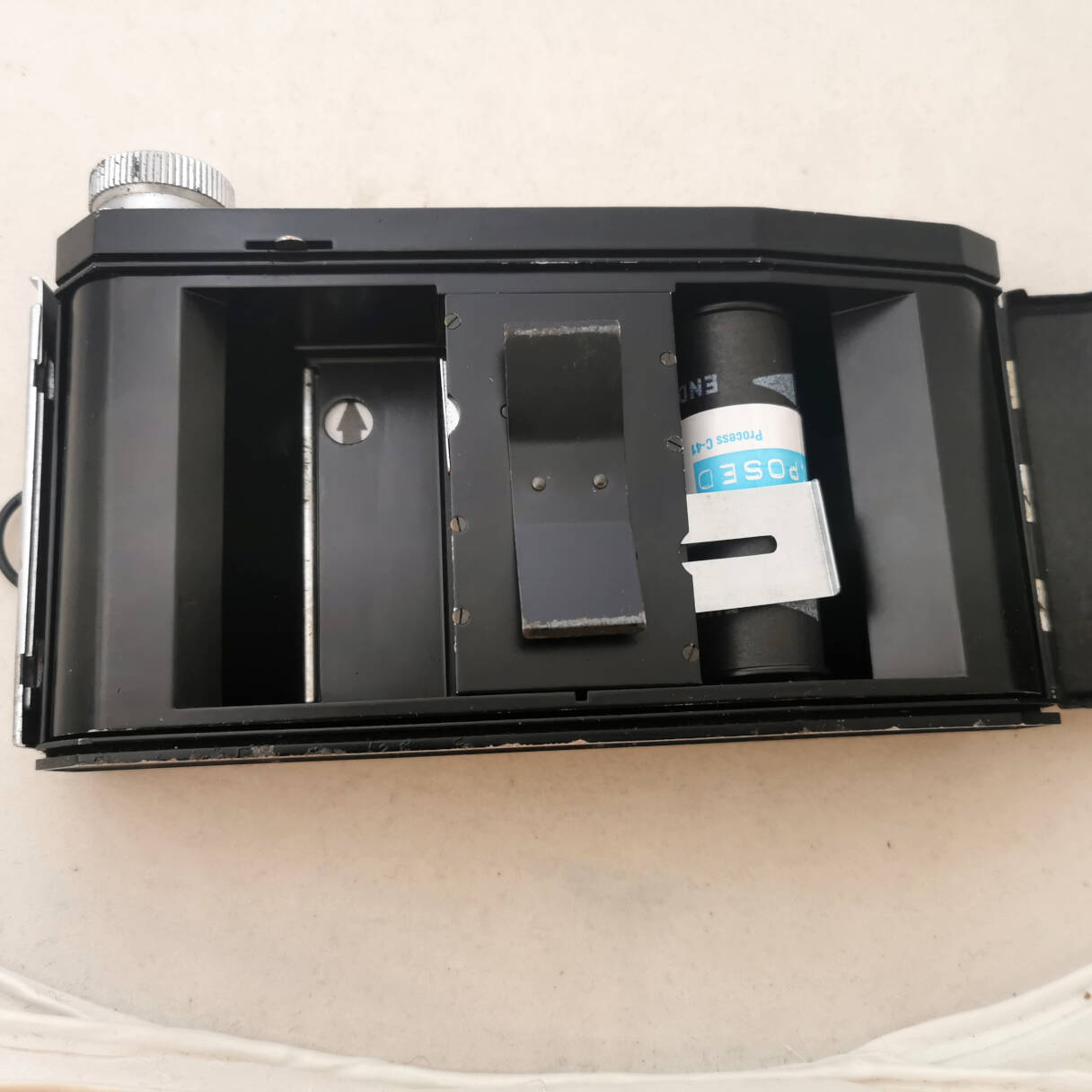
You can store 2 extra rolls of film inside the holder.

Close the holder. The counter window should look like this. If not, you
have to open the holder again in absolutely subdued light and turn a
little dented wheel inside until it's in the right position. Now action
the little lever and turn. It will stop at number 1. You have to action
the lever for each advance.
When all photos are taken, wind further until the film is completely wound. The
rolls are more prone to fogging, as there is less backing paper to
protect the film. Only unload in subdued light and protect the exposed
roll from light.
The camera is easy to handle. The screen is very bright. If you are
into 6x9 landscapes, it's a must-have. There are 6x9 folders, but their
rangefinders are not that reliable. 6x9 backs for large format
rangefinder cameras have the same problem and large format view cameras
with ground glass focussing are very slow. Both are bigger and weigh
more. So this camera fine for its purpose, even today. With a 6x9 and a
multi-format holder you have a good choice of formats. It's compact and
very sturdy. Another nice find.
Musashino Rittreck / Optika IIA / S-P Shutter Reset
Always cock the shutter before setting speed. The
setting knob turns when the shutter is released. It must not be
hindered from free turning! If you made a mistake, no panic, the
shutter can be reset. Push the shutter button in and hold or block it.
Make at least 2 slow full turns of the shutter cocking wheel. Release
the shutter button and cock again. Should be fine now.




















































